|
Garden Diary
Just Do It
Keep Calm Carry On Writing
Short Forms from Vowel
Signs Part 1
Short Forms from Vowel Signs Part 2
Short Forms from Vowel Signs Part 3
Garden Diary (5
February 2013)
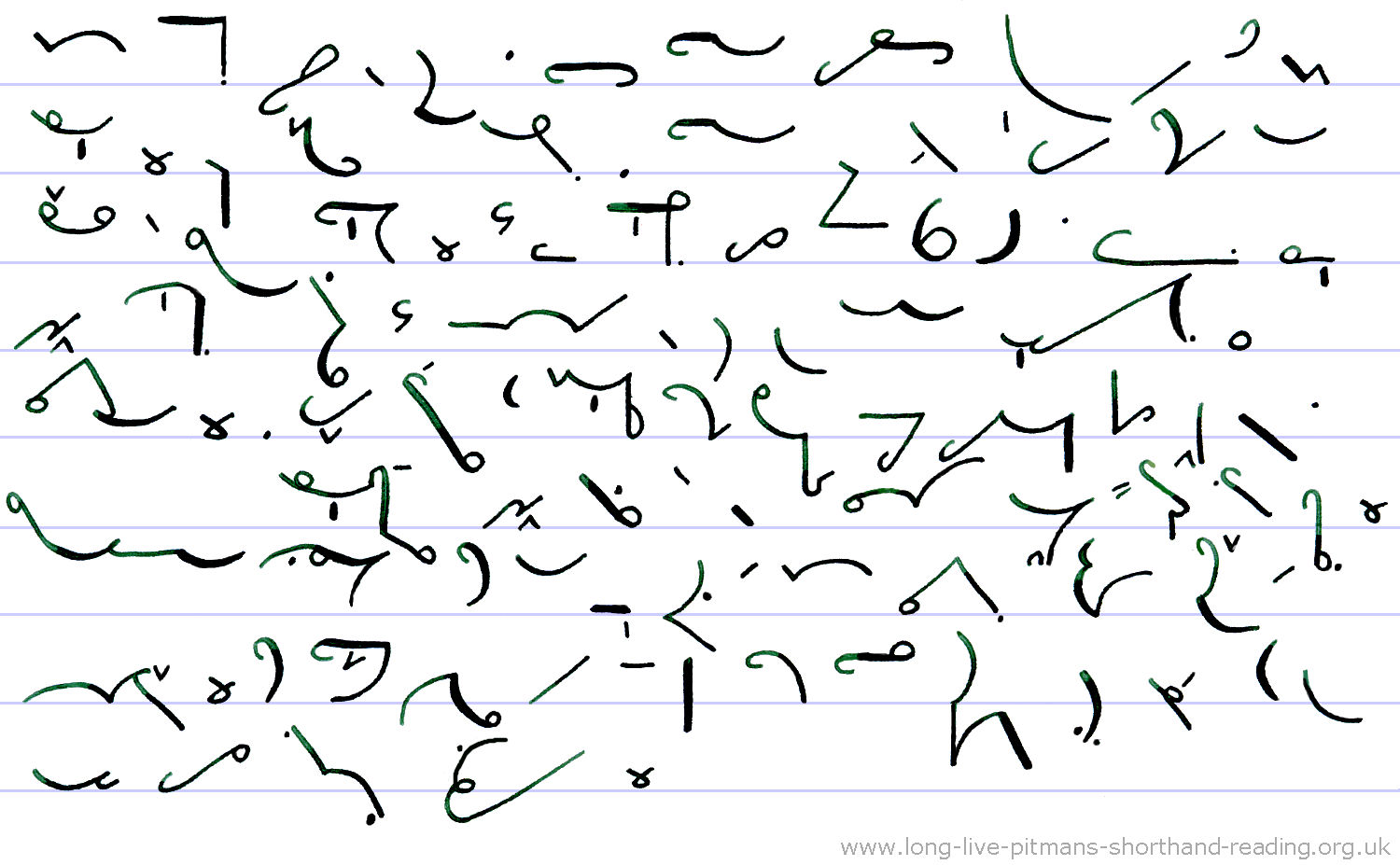
I am getting used to seeing a green garden once again*, after our short
bout of snow. Today I have been inspecting the garden to check up on
whether there are any signs of spring growth. With the cold gusty winds
this is usually a quick scoot round the muddy paths with the camera, to
see if anything noteworthy is happening. The white blobs that I noticed
from the safety of the kitchen window turned out to be a sprinkling of
snowdrops round the base of two small newly-planted apple trees.
Amazingly* they are in good shape,
and I am hoping that they will thrive
and multiply. Their greyish leaves are quite different from grass so it
will be easy to spot them if new ones appear elsewhere.
* Omission phrase "wu(n)s again"
* "amazingly" and "amusingly"
Always insert the vowel after the M in these and derivatives
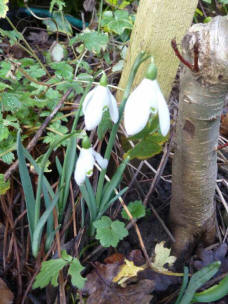

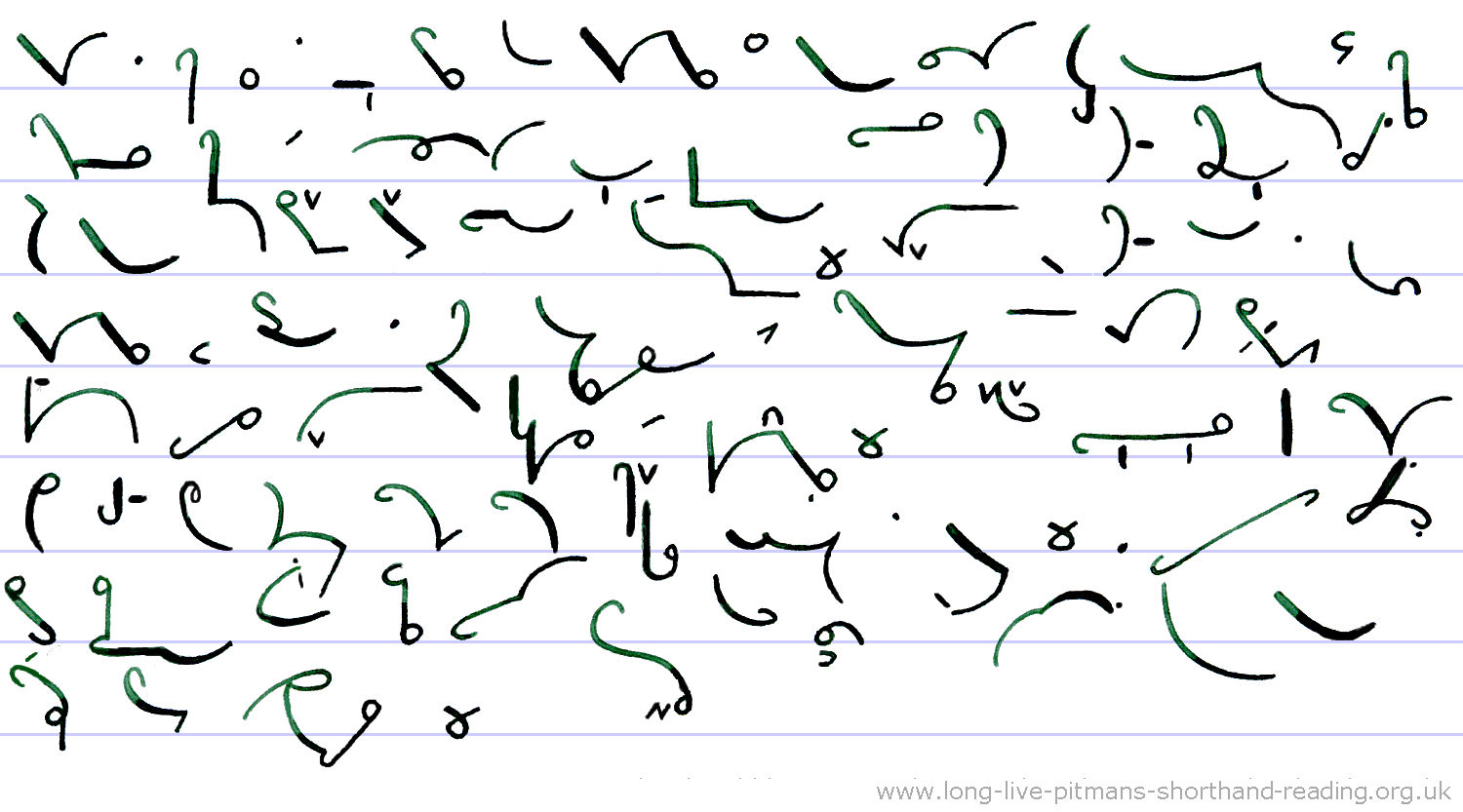
Below a tree is a good place for bulbs as, being small, they do not
interfere with the tree’s progress during the year*, and most importantly
no digging occurs there, so there is no chance of them being spiked by
the garden fork. I like to throw in a few bulbs when planting a shrub,
for this reason, and the branches can also support the taller ones like
daffodils and tulips. I find crocus do very well as they do not suffer
so much from the very dry conditions underneath a bush. The winter
jasmine has been struggling along with its yellow flowers, often
somewhat limp after being frosted over the last few weeks*.
* Omission phrases "during (the) year"
"last few wee(k)s"
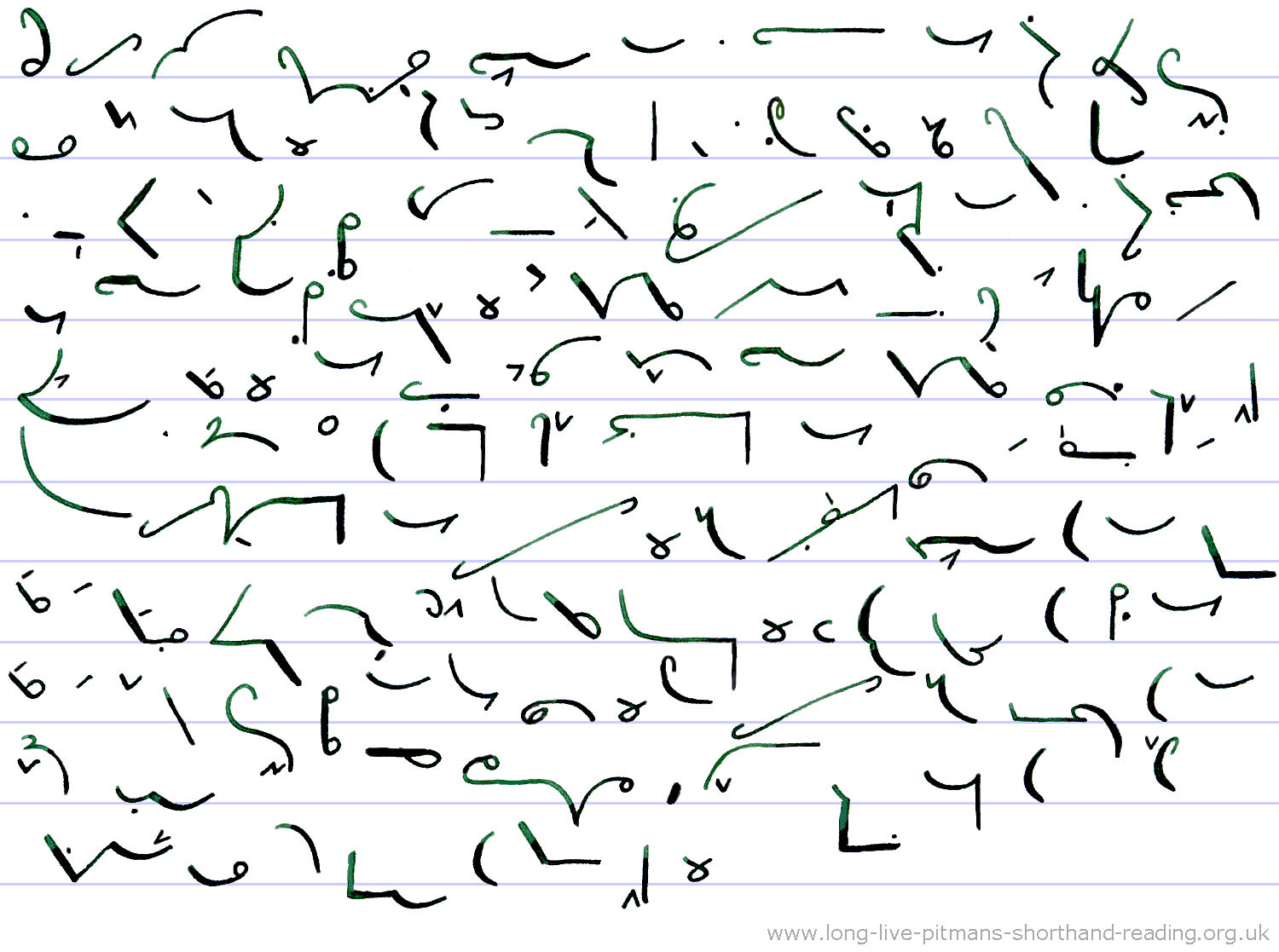
There is one little primrose growing in a crack in the path, which has
been flowering since about November. Although I cannot move it
to a
safer place, I think it is probably doing a good job of shedding seeds
that will come up elsewhere, notably in a patch of gravel under the
garden seat nearby.
All the bulbs are now coming through and the daffodils are showing their*
buds. In the clay soil of my garden bulbs seem to die out after a short
time*, as they get dry and cracked in the summer, and soggy and
waterlogged in the winter. I have resorted to growing them in big pots
and buckets, which can be moved around for best effect. When they have
finished, they stay in the pots and I put flower seeds in for the
summer. Over* winter I have to cover them in wire netting against
squirrels who like to dig into them, either burying things or digging
them back out.
* "showing their" Doubling for "their"
* Omission phrase "short (t)ime"
* "over" Keep well above the line, as
"every winter" would also make sense here

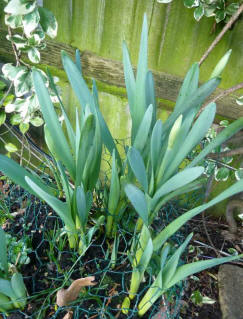
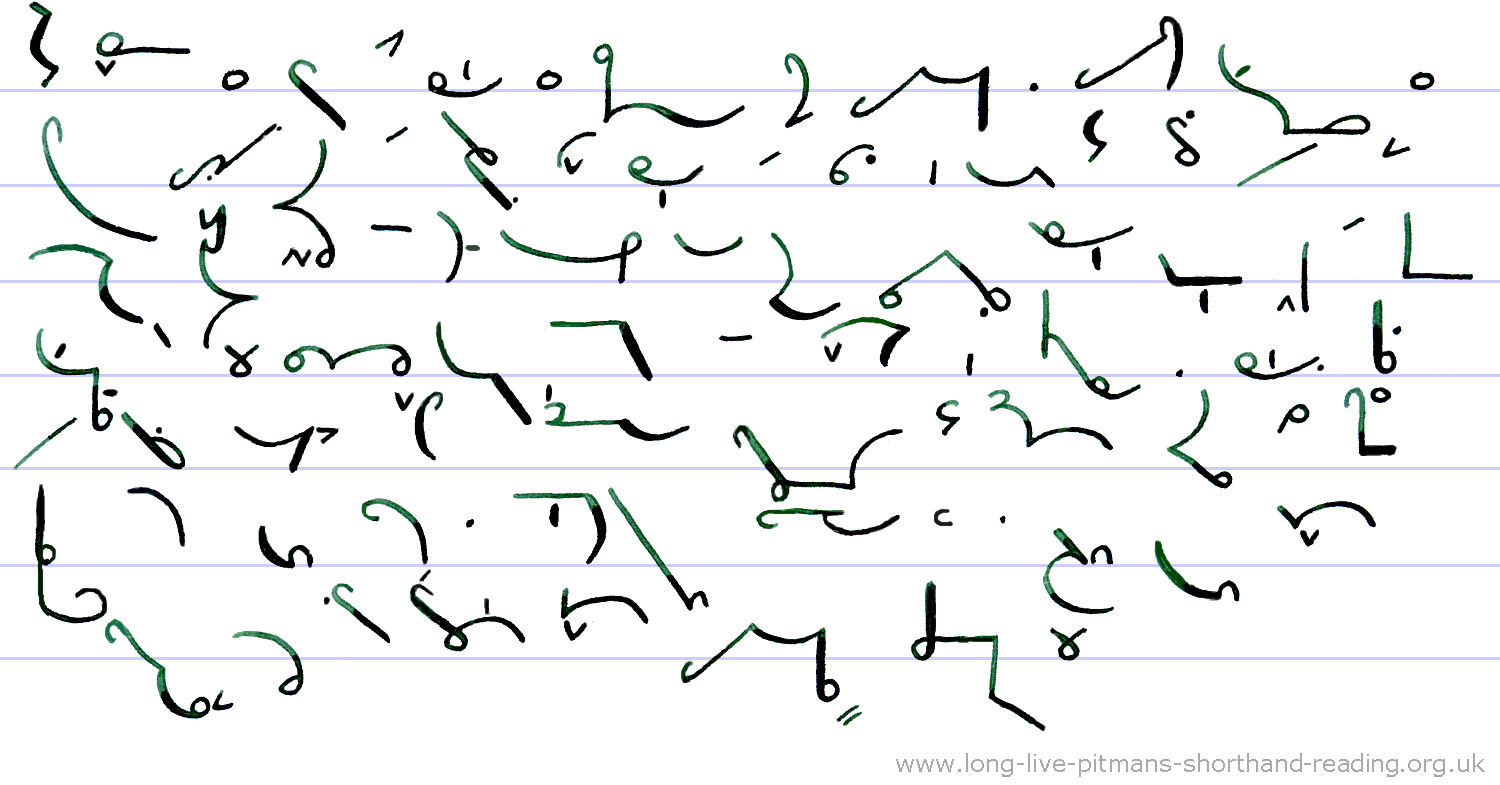
Although the sky is blue and the sun* is streaming through the window,
the weather forecast is further wintry showers and possibly light snow*
and sleet, but now that the plants are "on the move" I do not feel quite
so interested in seeing heaps of snow to go out and take photos of.
Sometimes February can be quite mild but at present the sunny days are
best enjoyed either walking briskly, with the warm shops as the target
destination, or viewed from a cosy computer corner, with a beautiful
view of my previous year’s apple blossom on my Windows desktop. (508
words)
* "sun/snow, sunny/snowy" Always put the vowels in

Top of page
Just Do It (15
February 2013)
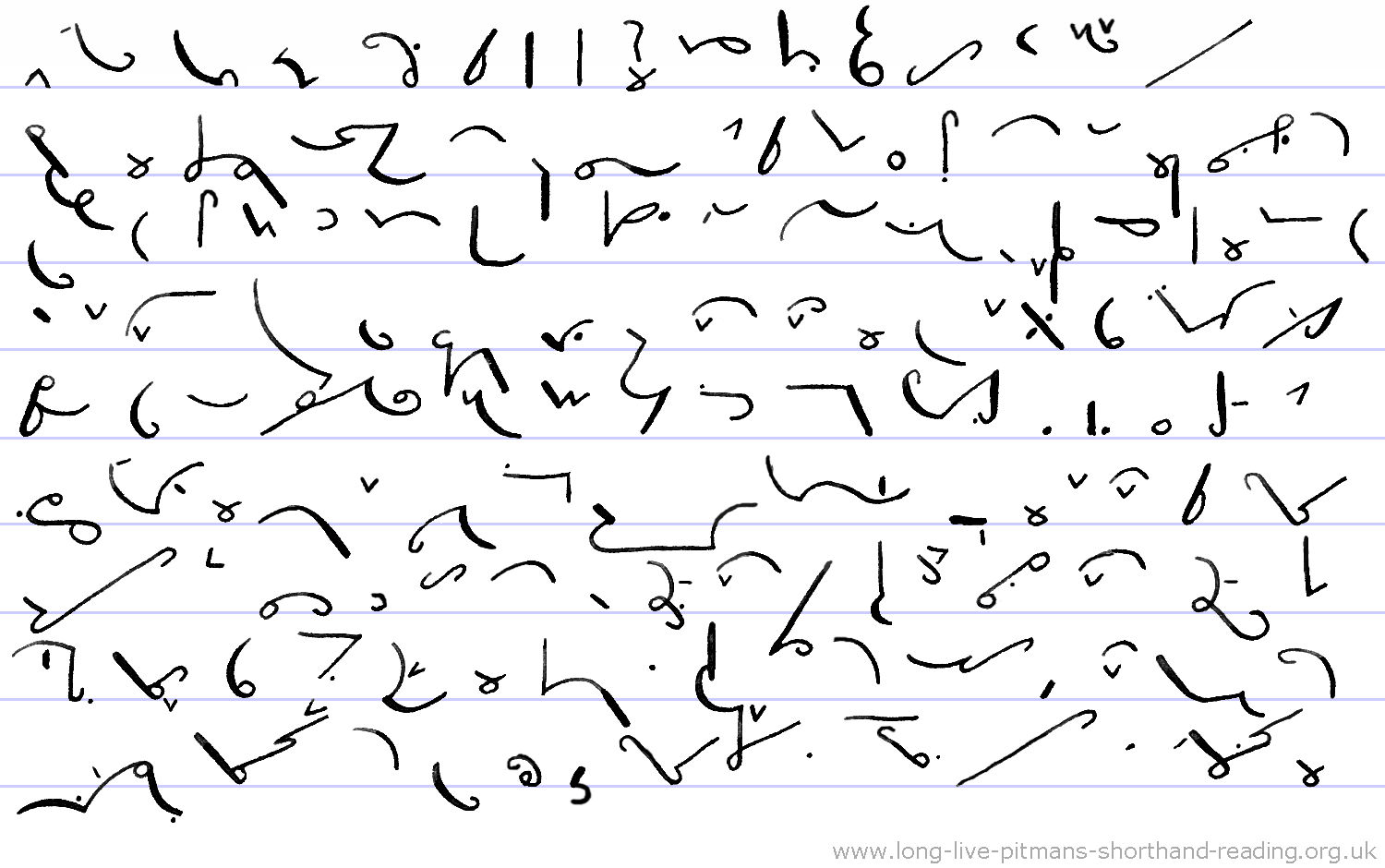
How often have you heard the phrase "Just do it"? I must admit that this
is one that I find rather subversive. It seems to be* encouraging me to
do something and the "just" part is telling me not to consider*, hesitate
or even think at all about what I am doing, at least* not
long enough to
decide against it. I can think all I like after the event, when it will
be too late to change my mind. If I obey this apparently urgent
suggestion, then any reservations I have about the action can be
overridden, the deed is done and the consequences follow. Maybe I will
have acted too quickly for my own good. I might just prefer to wonder
why someone would want me to suspend my judgement at that point, hence my
suspicion at the motive behind this catchy saying. It may be an
advertiser or anyone who might benefit from impulsive behaviour, or even
friends who would prefer an accomplice rather than an observer.
* Omission phrase "it seems (to)
be" "to (con)sider"
* "at least" and "at last" Always
insert the vowel
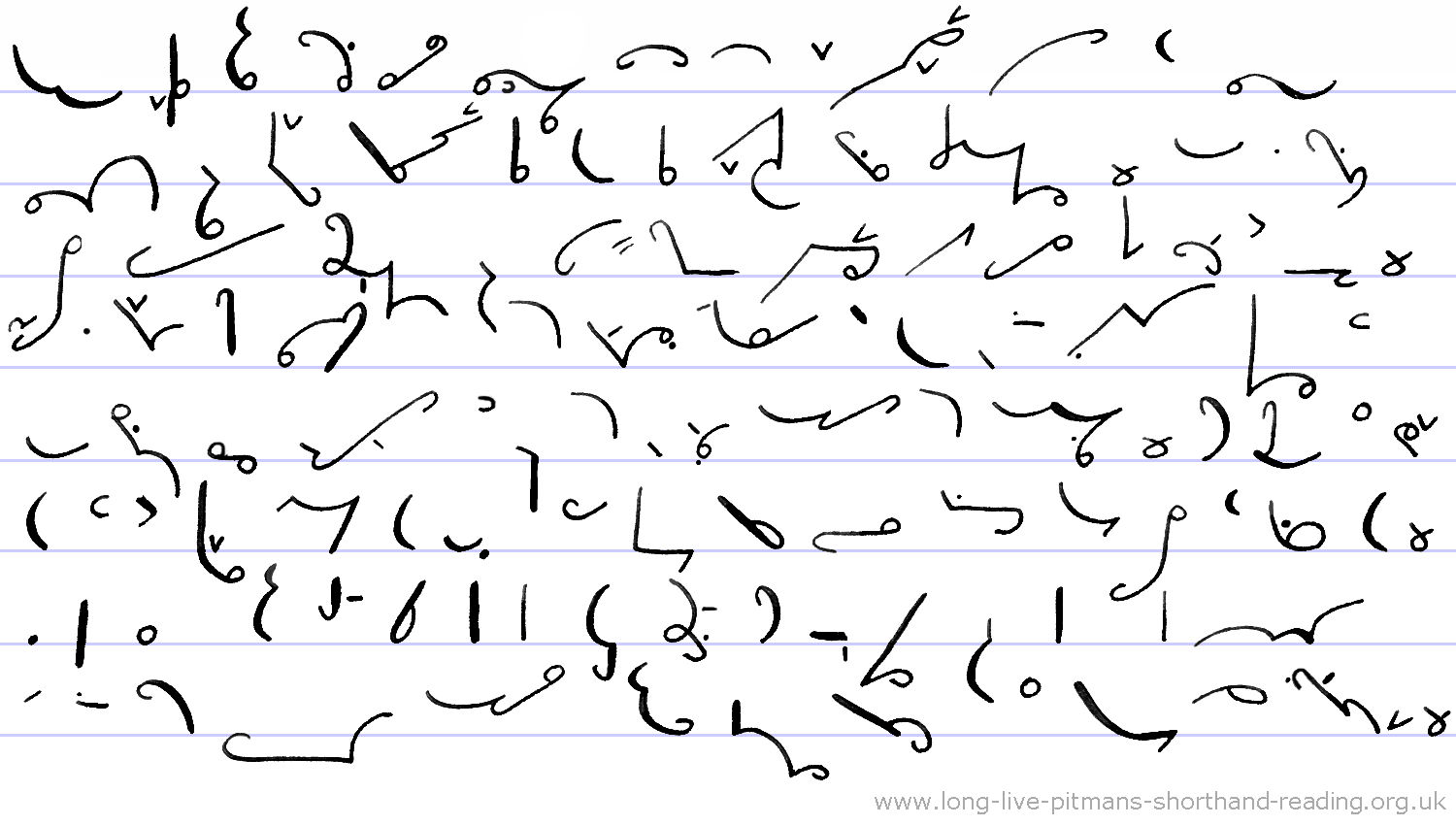
Having decided that this phrase serves someone else more than me, I
realised later on that something similar to this type of behaviour does
have its rightful place at certain times. In a pressured* situation where
there is no time* to think, well-practised reactions are the ones at the
front of the "queue". A pilot, doctor, soldier or police officer all
have to act rapidly at times, with no spare seconds to wonder what to do
or to consult anyone or anything else. Their training has supplied them
with all the advice and knowledge they need, in order to* take the best
course of action for the situation that faces them. The difference is
that they don't "just do it", they do not suspend their good judgement,
but they "do it immediately" and act very quickly in ways that have been
determined beforehand* as being the most appropriate*.
* "pressured" Keep the Shr stroke
clearly halved, as "pressure" could also make sense
* "there is no time" It is
generally best to insert the vowel in "no" in phrases, so that it never
gets misread as "any"
* "beforehand" Optional contraction
* Omission phrase "in ord(er to)"
* "appropriate" Always insert the diphone and the
first vowel in "proper" as these are similar in outline and meaning
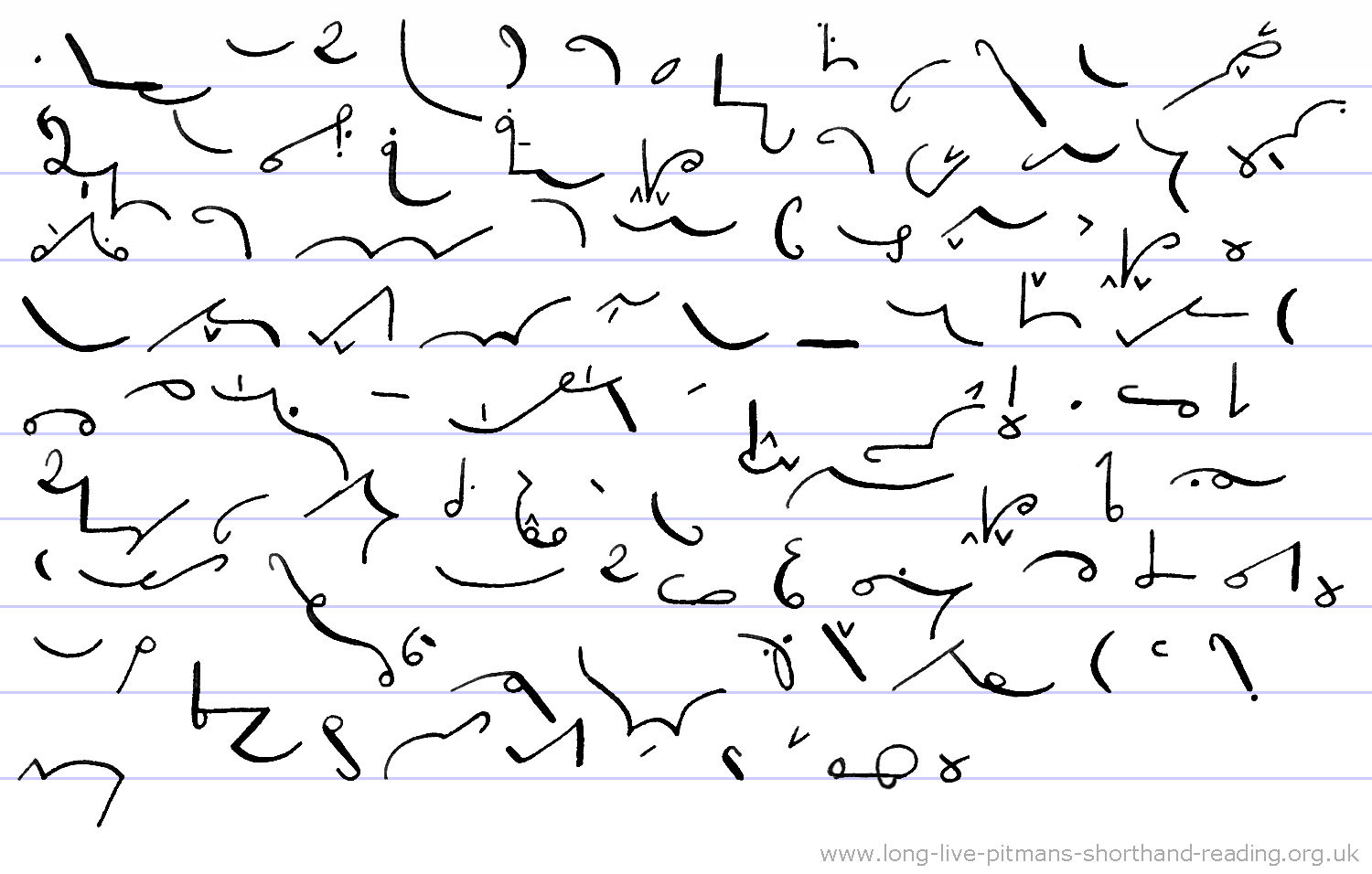
A beginner in shorthand, after their very first dictation attempt, will
probably have realised that there is no time* for hesitating,
considering, constructing outlines from theory, waiting for them to
slowly surface from memory, or anything other than instant writing of
the outline. Being required to write immediately and not being given
enough time to recall them seems most unfair, quite unreasonable and
downright cruel! A glance at the shorthand dictionary will reveal tens
of thousands of even longer outlines, and it is amazing* that anyone
perseveres in their shorthand quest with this seemingly impossible task
ahead. Any such discouraging thoughts must be firmly erased by replacing
them with remembering how much has been learned already and building on
the successes.
* "there is no time" It is
generally best to insert the vowel in "no" in phrases, so that it never
gets misread as "any"
* "amazing" and "amusing" Always
insert the vowel
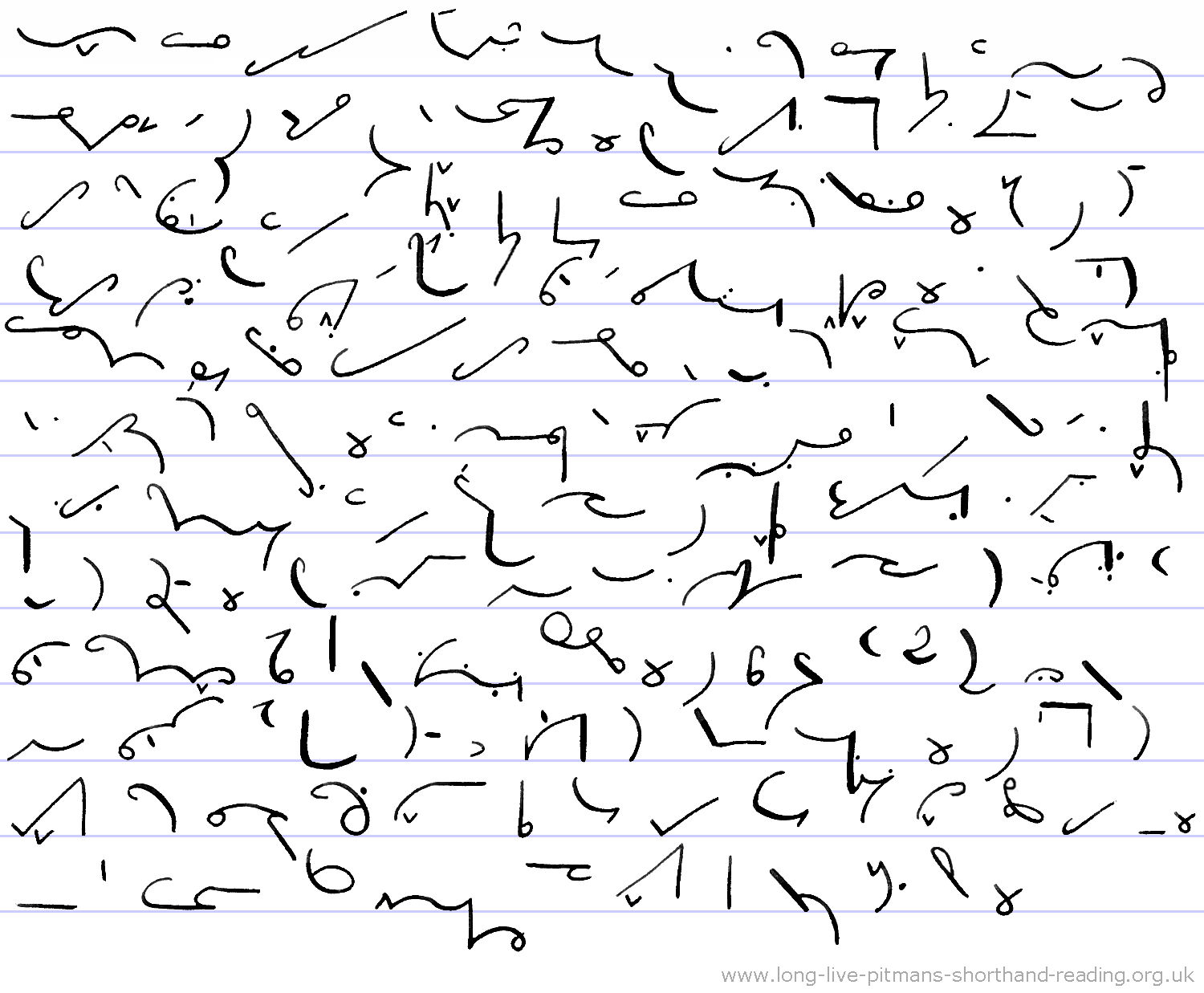
In my class we were fortunate enough to have a very skilled teacher with
many years’ experience, and she was always full of encouragement.
However, we did get a shock in one particular lesson when our
typewriting teacher took the class in her absence. I think she saw
everyone leaning over, slouching, and drawing slow and heavy-handed
outlines. A peaceful cosy classroom is not the place where one expects
to need or acquire the mindset of a runner or sprinter. With a mixture
of kindly impatience on our behalf and a desire to do away permanently
with our plodding manner, she decided that we needed a rocket under us,
so to speak*. Every mark written in a leisurely manner was consolidating
that slow frame of mind* and this had to be eliminated as soon as
possible*. She told us boldly that shorthand was not meant to be written
slowly and that doing so would hold us back indefinitely. She got us to
write very simple phrases like "it is" "for the" "to our" along the line
as fast as we could*. "Come on, quicker, faster, how many times can you
write it before I say stop."
* Omission phrases "so (to) speak"
"frame (of) mind" "as soon as poss(ible"
* "we could" Not phrased, so that
it does not look like "we can"
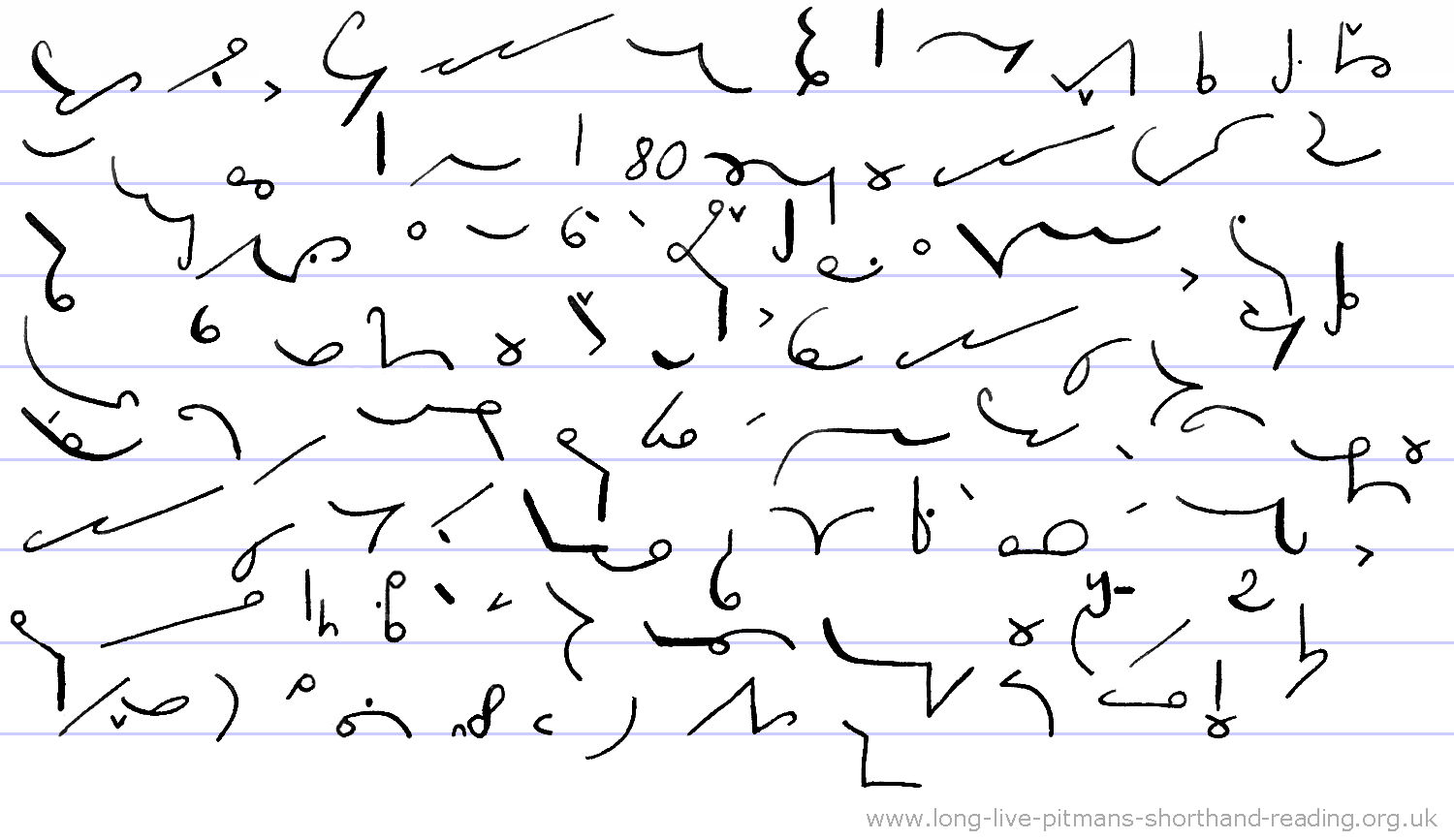
Everyone rose to the challenge and we were informed that those who had
managed to write "it is" ten times in fifteen seconds had written at 80
words a minute. We were thoroughly astonished by this revelation, as any
thoughts of high speed had been seen as belonging to the far distant
future, that is, next term. By the end of the lesson we were still full
of energy, buzzing from our unexpected speed achievements, and looking
forward to more next time*. We were still only raw beginners, but this
early taste of success and introduction to the speed writer's attitude
set us all on the path to exam victory. I don't think our shorthand
teacher recognised us as the same students when she returned to take her
class!
* Omission phrase "ne(k)s(t) time"
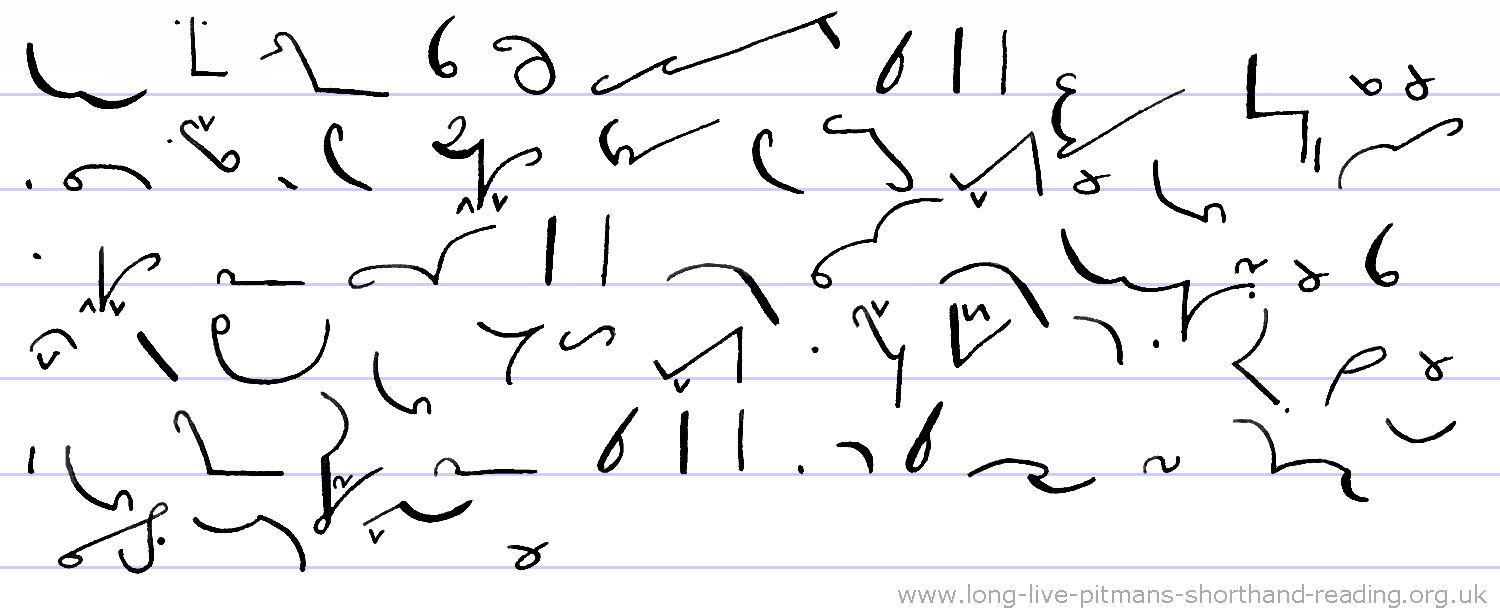
Having attacked and practised those phrases, we were able to "just do
it" when they were dictated to us. The same applies to every shorthand
outline that you are ever called upon to write. If you learn an outline,
you can merely "do it", maybe slowly, maybe eventually. This might be
sufficient if you only want to write a private diary or a shopping list.
But if you practise assiduously, you can "just do it", the word "just"
meaning you have removed any hesitation in your writing.
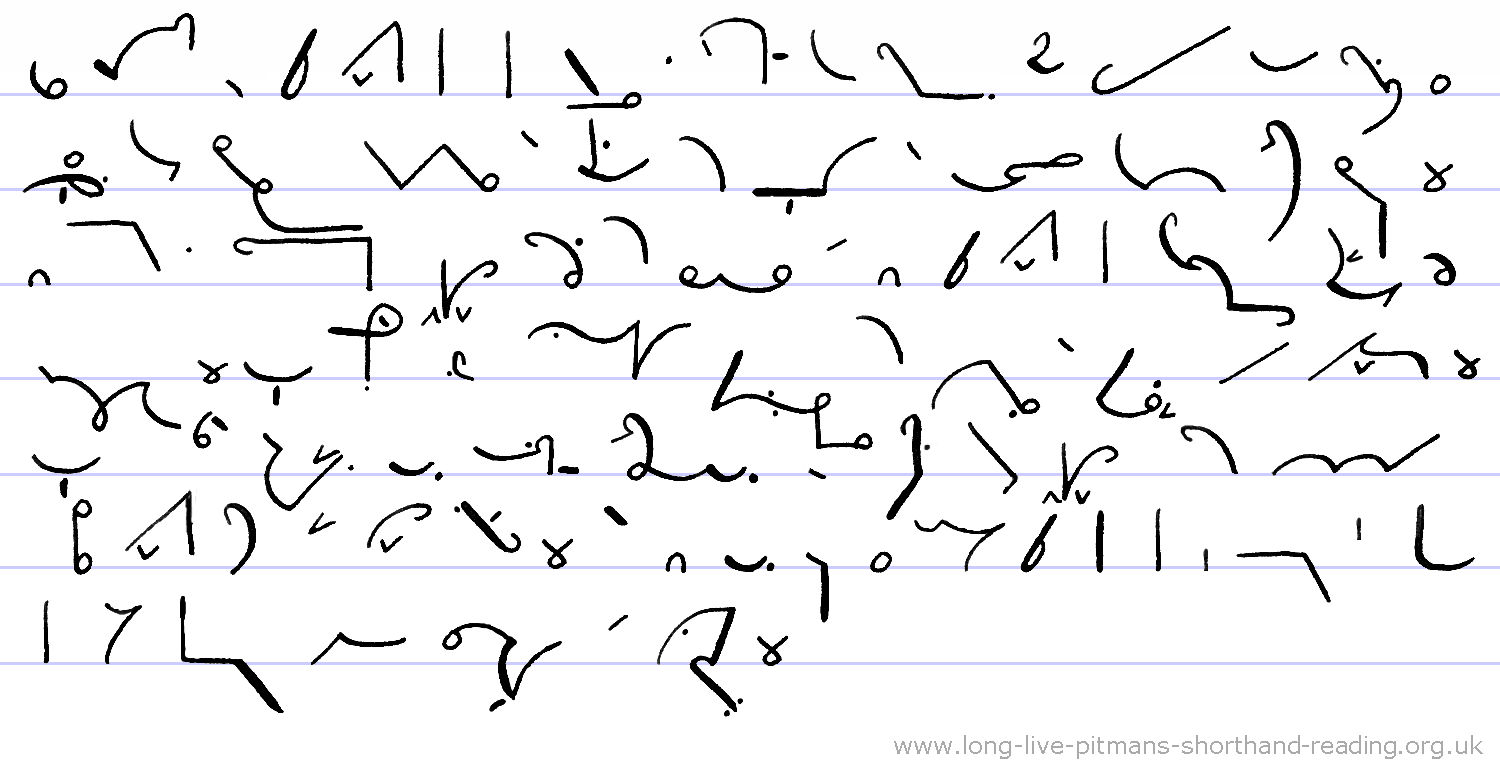
If it is altered to "just write it" it becomes a motto for practising
shorthand, where any pressure is self-imposed for the specific purpose
of attaining your goal of increased familiarity and therefore speed. You
copy a correct outline, phrase or sentence, and you "just write it" over
and over again*, saying the words to yourself. No exhausting effort,
mental gymnastics or leaps of genius are required. No thoughts of theory
need intrude and there is no need to dredge up the outline from memory,
as it is right there on the line above. All you need to do is not only
just do it, but keep on doing it until it can be written smoothly and
legibly. (969 words)
* Omission phrase "over (and) over
again" The second "over" is reversed in order to gain a good join
Top of page
Keep Calm Carry On Writing
(17 February 2013)

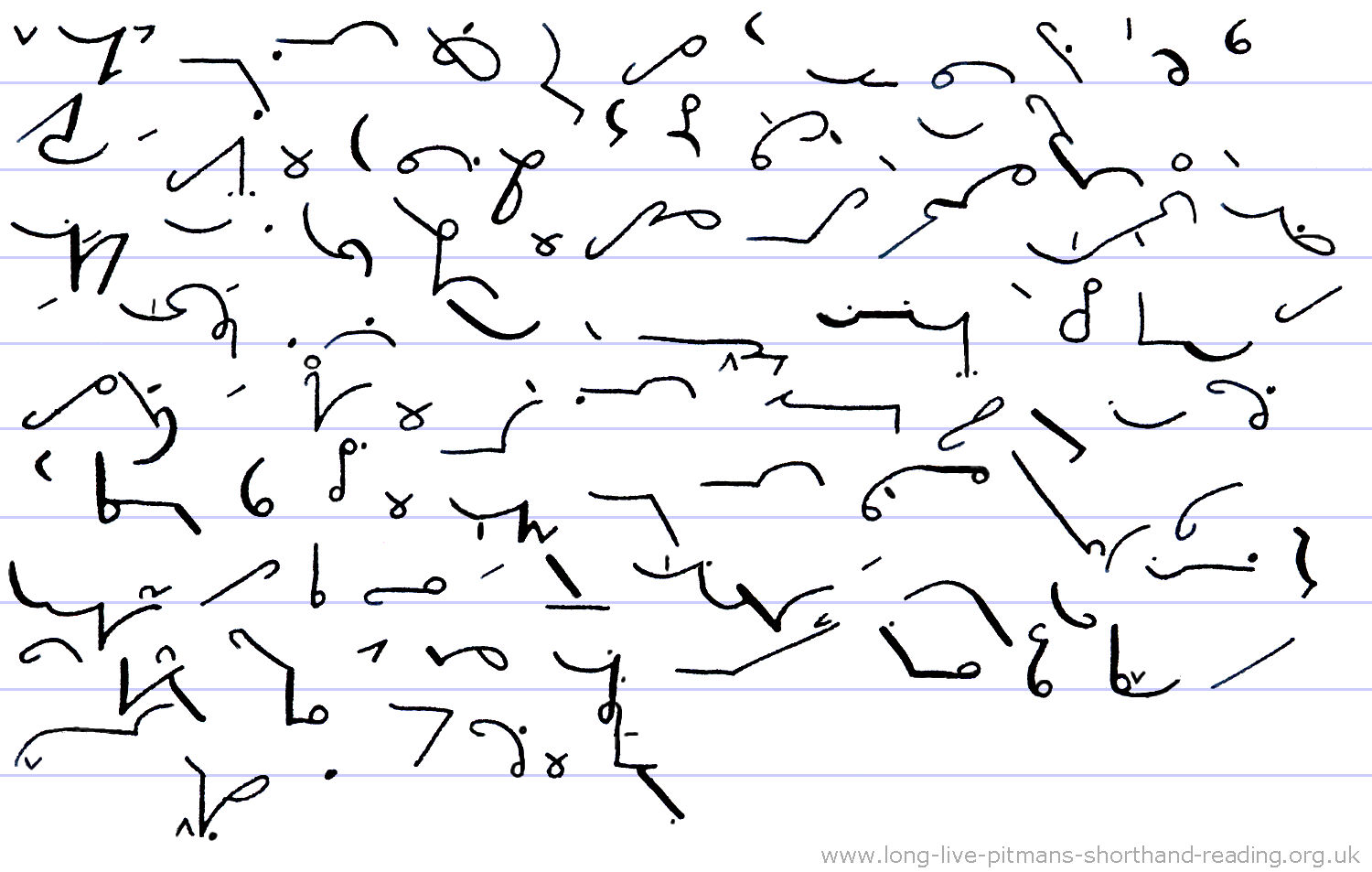
I enjoy the Keep Calm posters, especially the ones that include some
play on words that is original and witty. They seem to suggest that the
standard solution to any problem is to indulge in a favourite pastime.
One must carry on regardless, unruffled, unfazed and unflustered*, the
aim being to counteract the indignity of circumstances taking away one’s
composure and self-control. Cool, calm and collected used to be the
common phrase that described this stance. No doubt the Keep Calm
slogan’s popularity will eventually run its course and become
unfashionable and maybe even antique, although the more durable products
and the almost indestructible carrier bags with this design are likely
to outlast the catchphrase.
* "flustered" is written with a left FL, as are
all outlines beginning FL

Absolute knitter's favourite: Keep Calm Carry Yarn
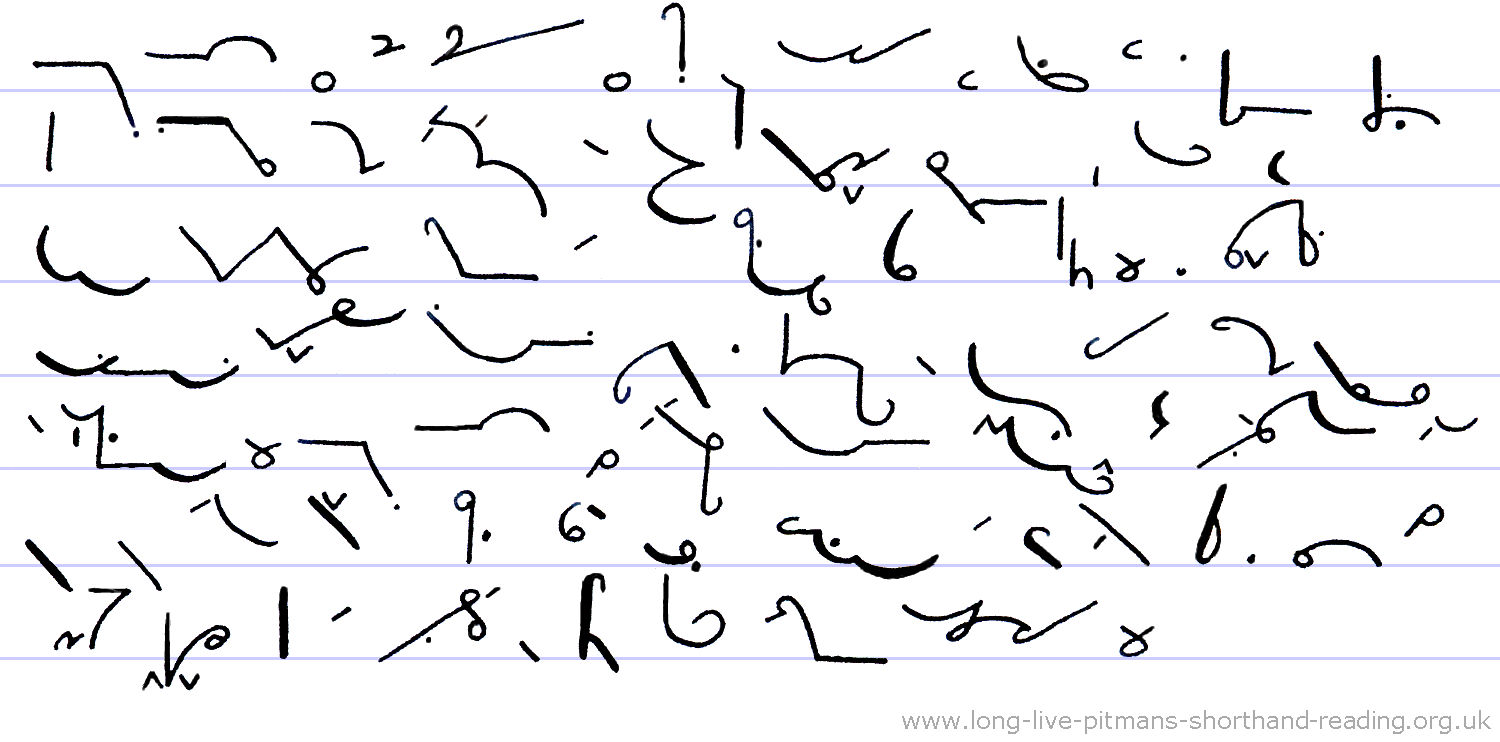
Keeping calm is what the shorthand writer* is trying to do anyway, when
faced with a difficulty, dismay at gaps or the horror of falling behind
the speaker, but often without having purposely practised and
strengthened this attitude. The slightest inkling of rising panic will
be a temptation to veer away from the business of note-taking. Keeping
calm is the opposite of panic, and I have found that the resolve not to
be put off by stray thoughts needs cultivating and building up just the
same as the actual outlines do, and responds to deliberate attention and
practice in the same way.
* Omission phrase "short(hand)
writer"

Battlefield of the mind, my friend - resist - stay steadfast!
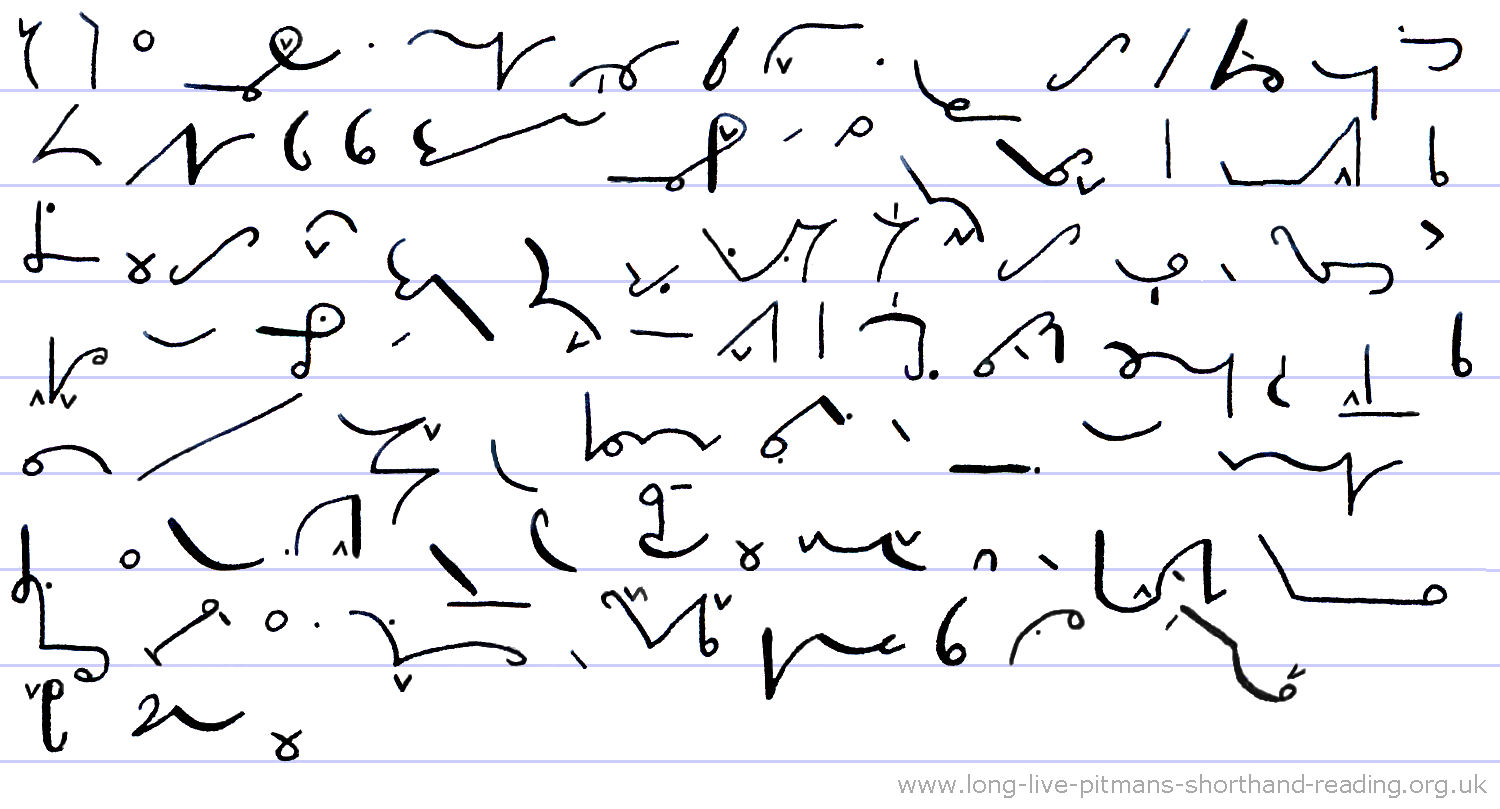
I think of it as exercising a mental "muscle" just like a physical one,
which jumps into action much more* readily than those that were not
exercised, and has the power behind it to carry out its task. One might
think it would be easier to wait patiently until one knows to perfection
all the outlines in existence and can write at umpteen hundred words a
minute*, but that outcome does seem rather unlikely if, at the same time,
the habit of giving in to mental distractions is being allowed to become
ever stronger. I invite* you to download the pictures to use as a
reminder to prioritise dealing with this less obvious side of shorthand
writing*. (334 words)
* Omission phrase "much m(ore)"
"words (a) minute" "short(hand) writing"
* "invite" Helpful to insert the
vowel, as it could be misread for "invade" in some contexts, the opposite
meaning
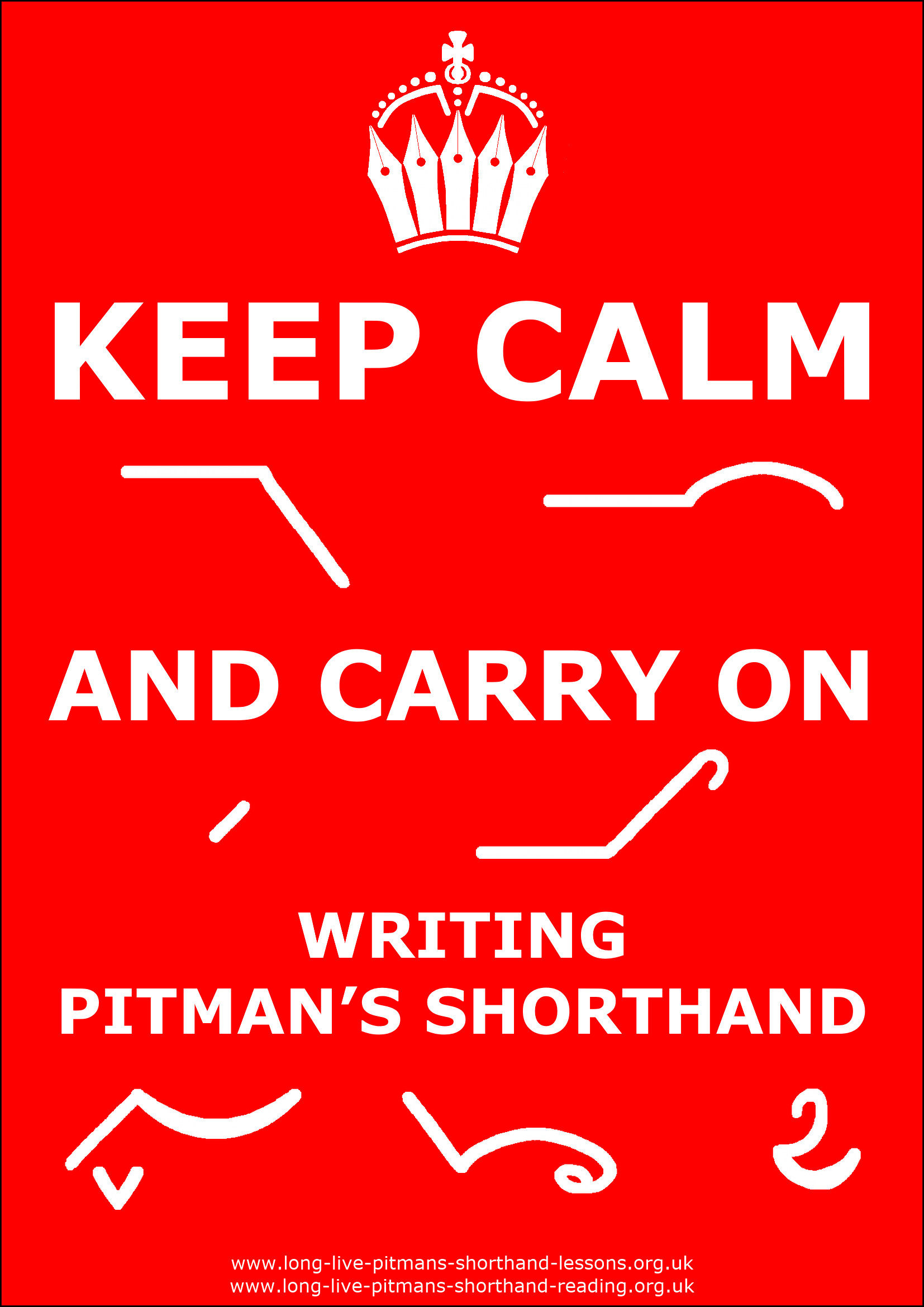


Keep Calm Poster
63KB, Nibs Crown 26 KB, and Bookmark 36 KB
Save these GIFs from this page, they
have crisp edges and flat colour so that you can recolour as desired and print
your own items
Top of page
Short Forms From Vowel Signs Part 1
(28 February 2013)
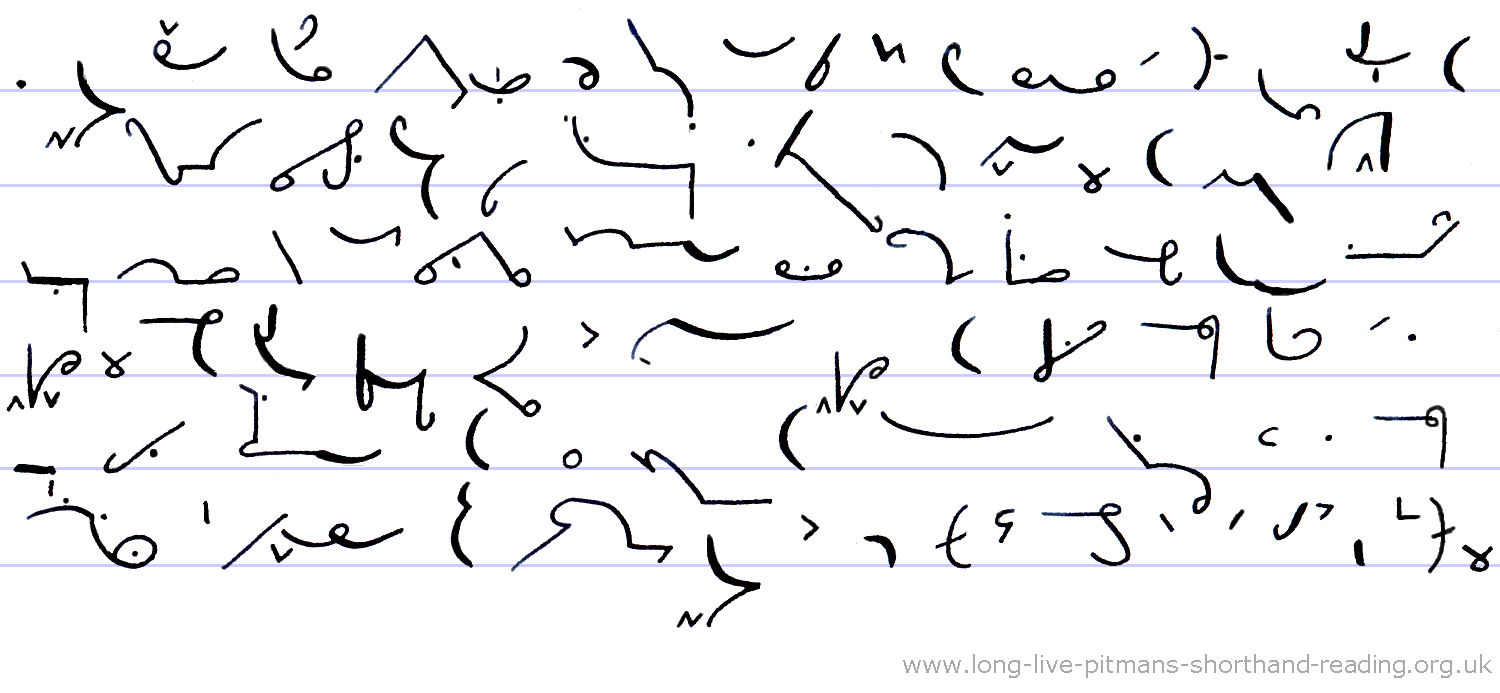
The vowel sign short forms represent the commonest words, appearing in
just about every sentence, and so if you do not know them perfectly,
hesitation over them will affect a large proportion of your writing.
They should not be allowed to get mixed up in the hopes of making sense
from the context, instead of having accurate outlines. Because they do
not have the distinctive shapes of the longer outlines, they deserve
extra attention and a good way of tackling them is to practise them in
their pairs, with an extra emphasis on recognising that they reflect the
vowel of the word (with the exception of: "and", joined "he", "why").
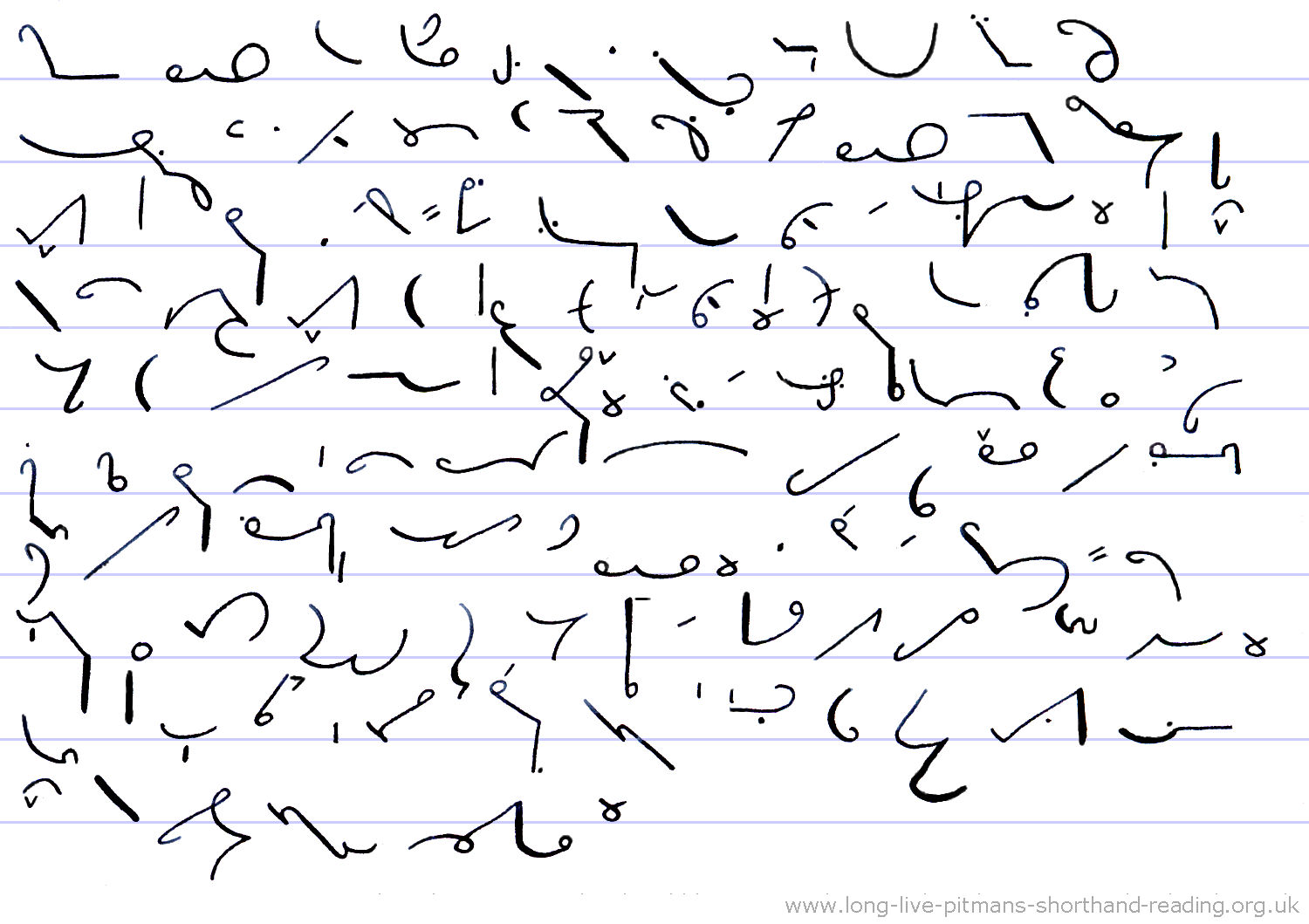
Practice sentences for short forms tend to be a combination of good
efficient compact phrases interspersed with a row of some that cannot be
phrased, and such sentences can be surprisingly difficult to write at
speed, the stop-start effect being slow and unsettling. It might be more
helpful to write them at comfortable (not slow!) speeds, for
consolidation of your knowledge of them, rather than going at high
speed. Complete and instant familiarity with them is what will
contribute towards speed improvement on more normal matter, where these
signs are scattered through, rather than concentrated in one short
sentence. A spot and blemish-free notepad is also essential so that the
only dots and dashes are the ones that you have written. If you had no
choice but to use spotty paper on occasion, then changing to red ink
might be useful to prevent misreadings.
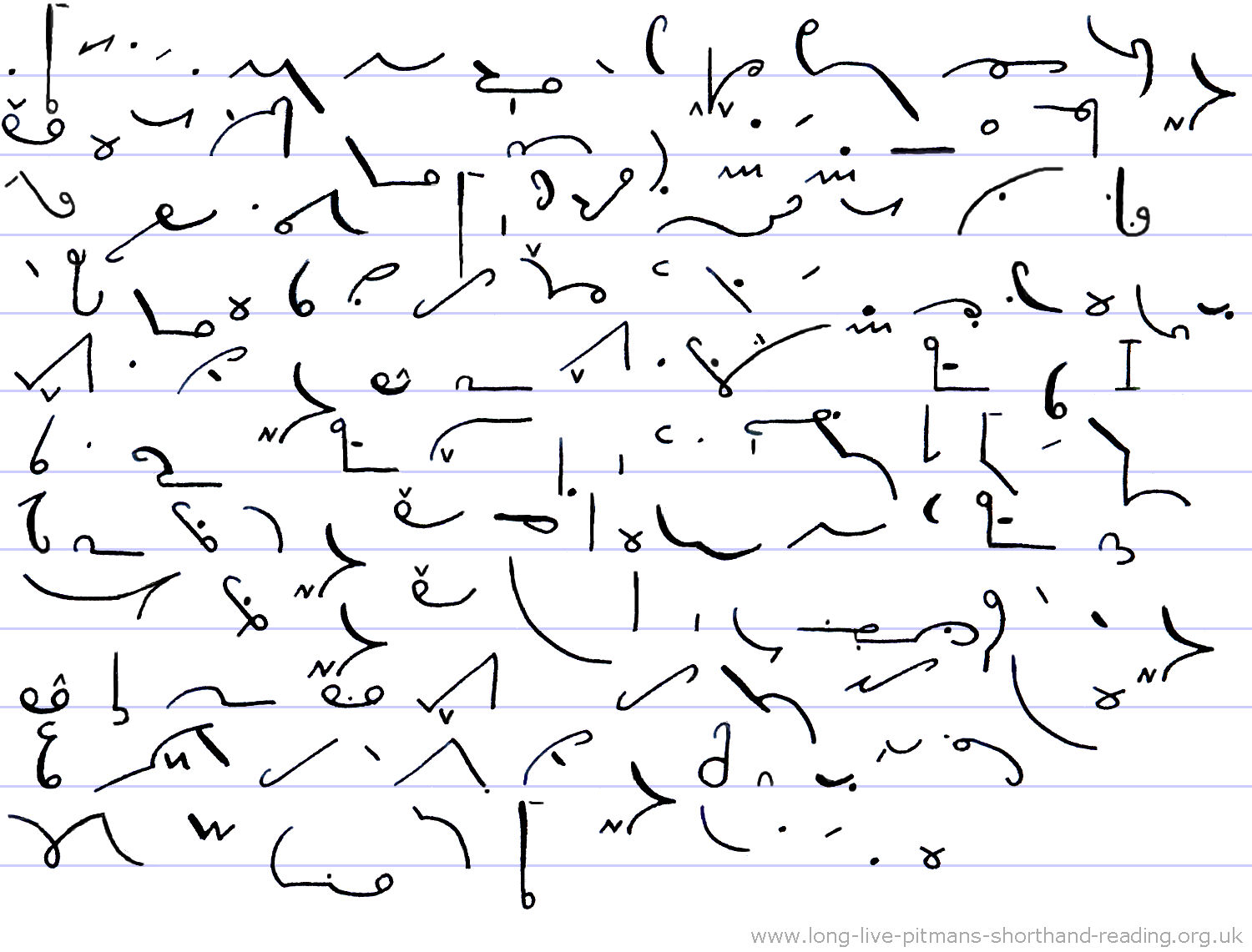
THE DOTS – "A/an" and "the" should not be written too close to other
outlines, as they may be mistaken for their vowel signs. In the older
books you may see "ah!" and "eh?/aye" given as extra options using a
heavy dot, but they are not always mentioned in the later editions of
instruction books. This last one rhymes with pay, and "aye" means
"ever". If you need to write a lone vowel sound, you can write a
placeholder stroke thus – (I) – which is a vertical stroke like Tee but
with a crossbar at the top and bottom, and then you can place your vowel
sign against it. Having written that stroke, you would naturally place
the vowel sign after it, but if the exclamation consisted of two vowel
sounds, it would make sense to write one before and one after. With this
reliable way of representing lone vowel utterances, you need not concern
yourself about the thickness of your dots for "a/an" and "the".
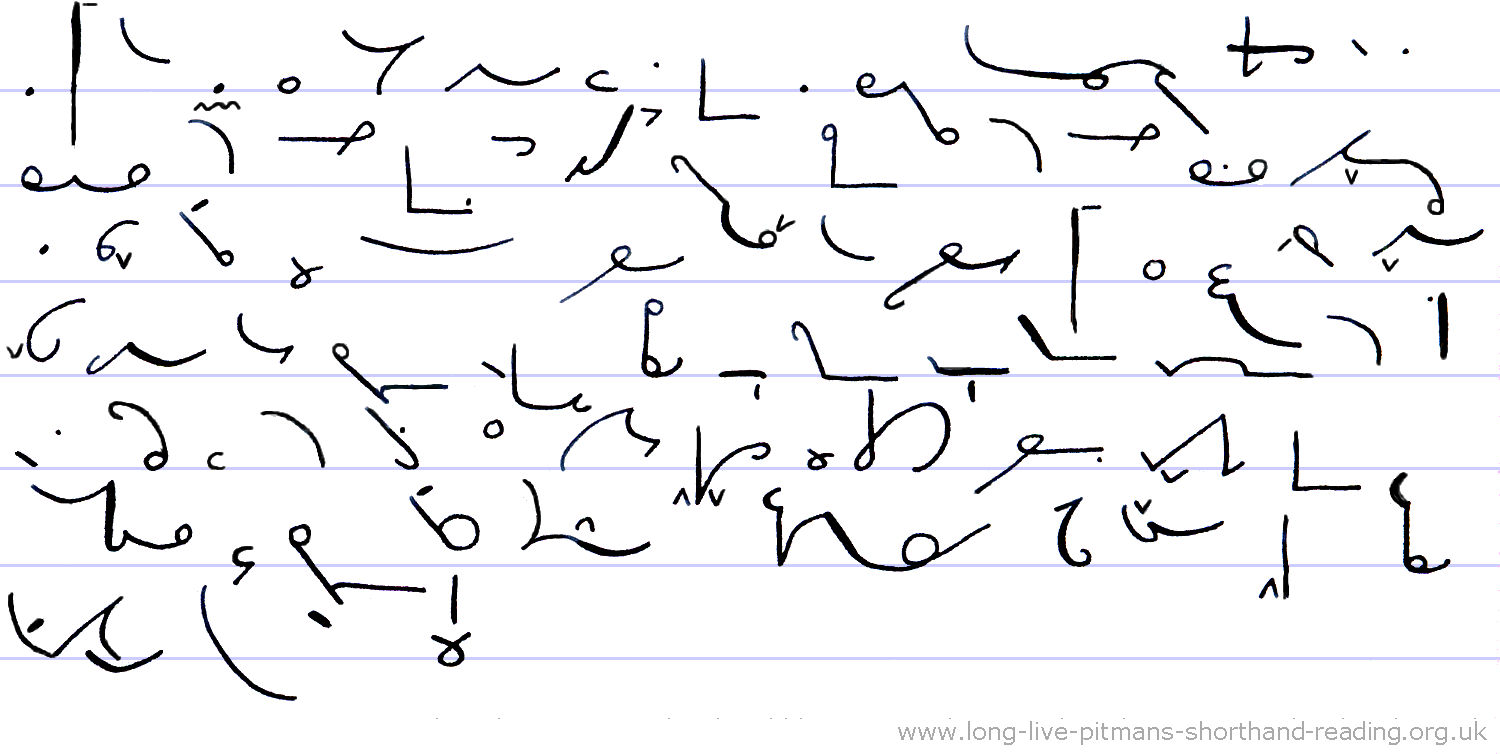
The dot for "the" is only written when a tick "the" is not possible*, for
example at the beginning of a sentence or because the tick cannot join
the previous stroke or because the sense requires a slight pause.
Another reason for using the dot is when you have stopped writing while
waiting for the speaker to continue, as it is not good practice to go
back to make or add to a phrase when your pen has left the outline. It
is also risky to write the tick in advance when the speaker pauses,
assuming that it will be necessary, and then finding out that it is not
forthcoming after all!
* Omission phrase "it is not
poss(ible)
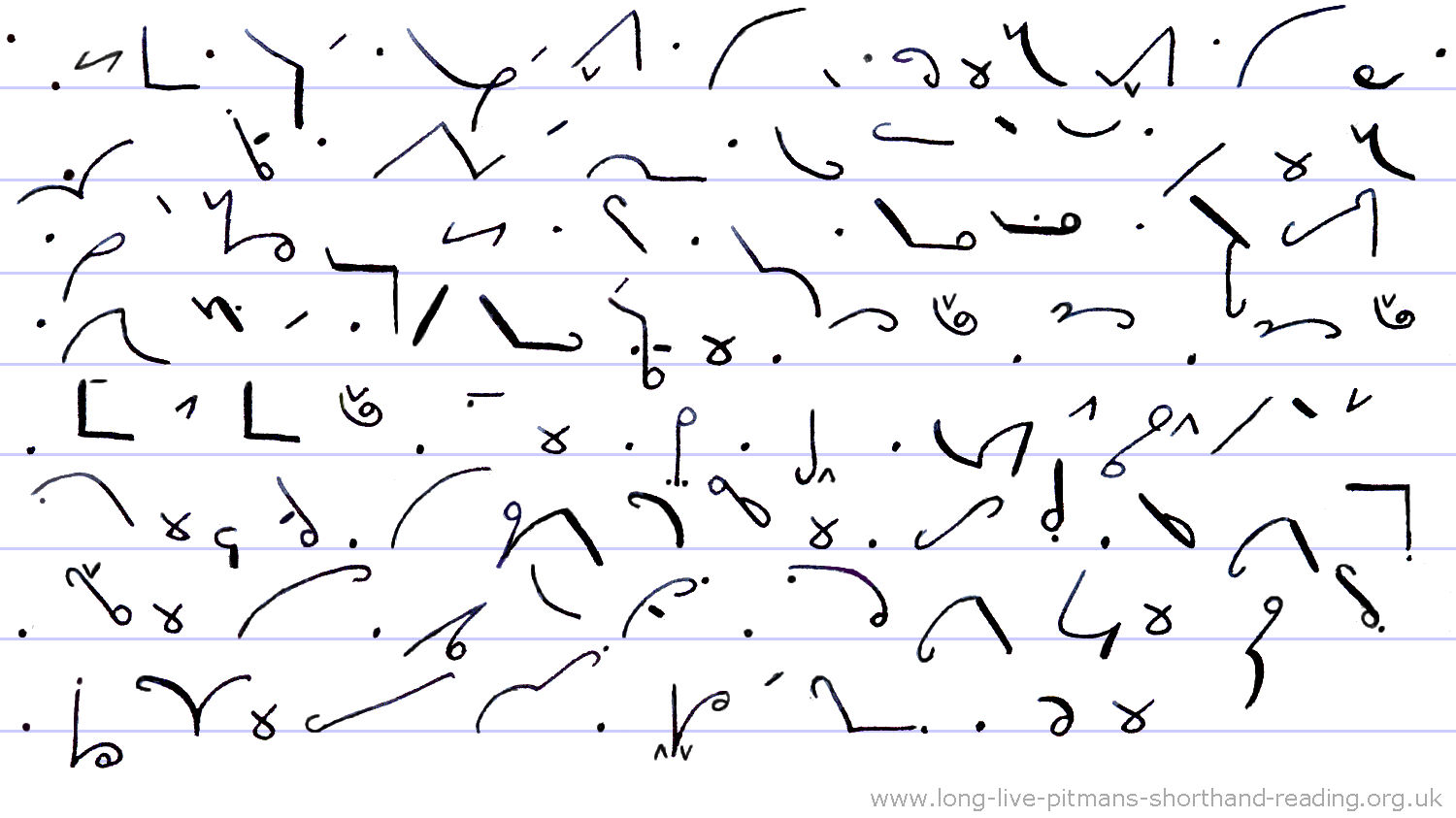
A/AN, THE Take a pad and a pencil, and write a letter to a friend. I
have to write a letter, send an email, compose a report and make a phone
call, all in an hour. I have a list of items to get, an apple, a pear,
a box of eggs, a bottle of water, a loaf of bread and a large bag of
potatoes. The man finds the woman, the woman finds the dog and the dog
finds the cat. The city, the town, the village and the house are all on
the map. When he opens the letter, he will be very surprised. The one
dancing the best will be getting the prize. Later on the rules for
loaning the cars will be changed. He was balancing the commitments very
well. We are learning the outlines and practising the words. (673 words)
Top of page
Short Forms From Vowel Signs Part 2
(28 February 2013)
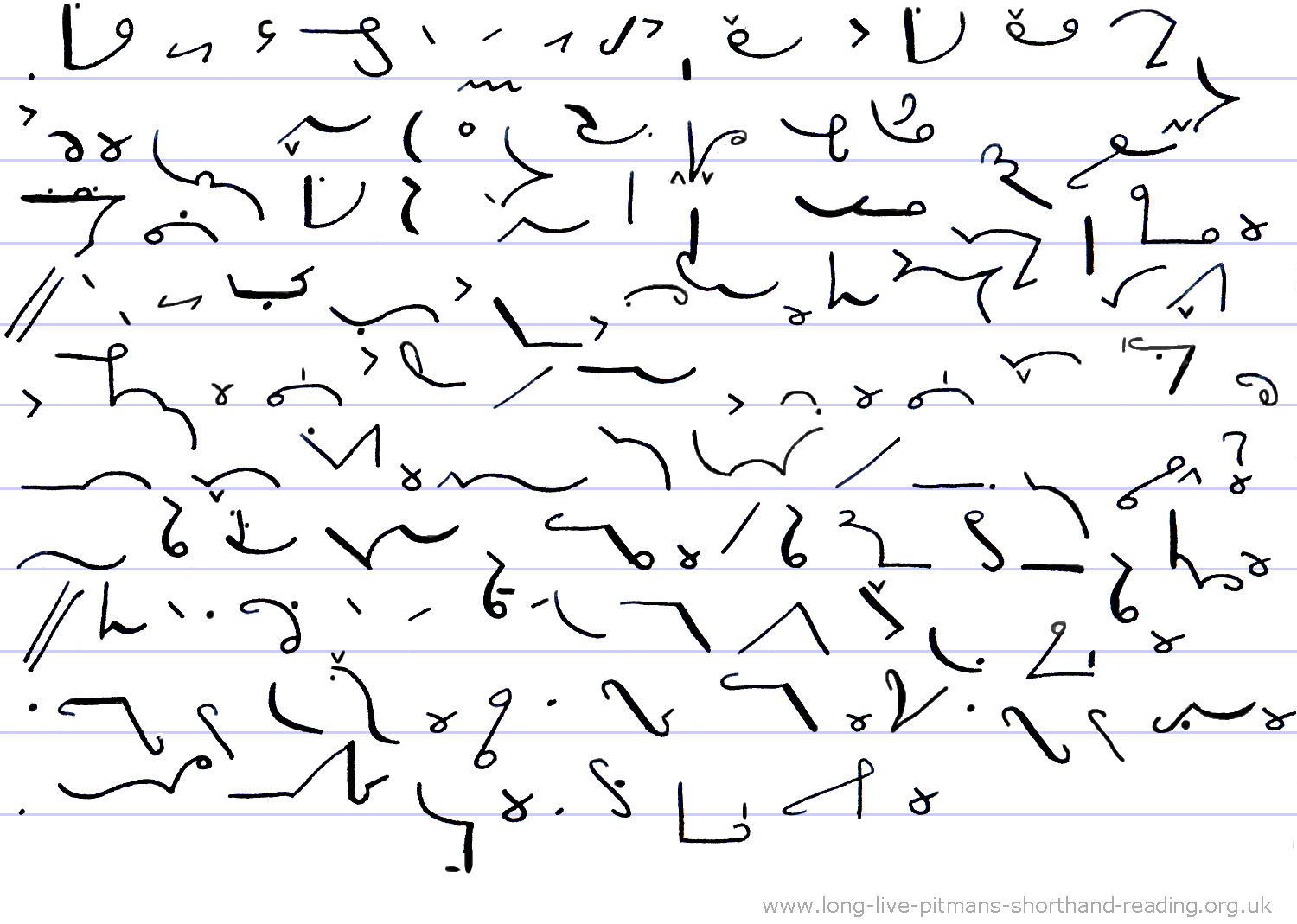
THE DASHES With the exception of "and" and the joined "he" sign, all
the dash signs match the vowel of the words. If you were* writing them as
full ordinary outlines, instead of short forms, you would be using
exactly the same dash, although written at differing angles to match the
different strokes.
OF, TO I gave the name of the book to the man. At the end of the month
I will write to the customer. Some of the staff are going to the
meeting. Some of my college friends came to my party. How many of your
family are coming to your house? Many of those attending belong to those
clubs. Much of this work has been given to this department.
At the end of a phrase, "of" and "off" can be represented by the V hook.
A group of people have arrived. He is a member of the club. There are a
number of people waiting. The animals carried off the food. The plane
took off yesterday.
* Omission phrase "if you (w)ere"
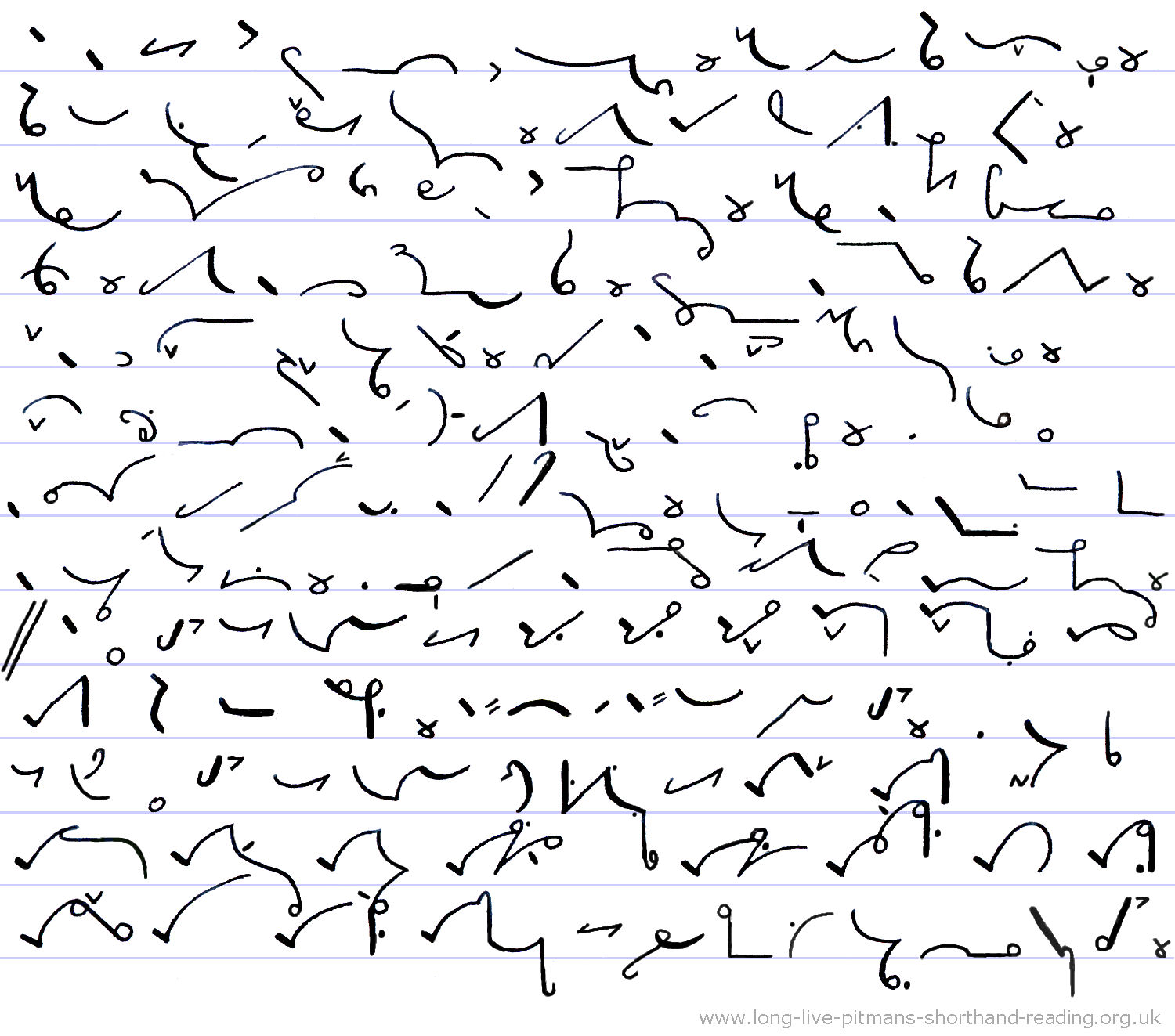
ALL, TOO/TWO All the people came to the interview. I have written all
this in my notes. All those in favour should sign the form. We have all
our staff ready to start the job. I have seen all your letters that you
sent to all the customers. I have received* two telephone calls this
morning. We have two men working on this. Please make two copies
of this
report. I too would like to apply for this post. You are all too kind
and I thank you for your comments. My friends came too and so we had to
find two more seats. The office is too small, we really need two much
larger rooms. If the coat is too big, I can take two inches off the hem.
The goods are too expensive and we have lost too many customers.
"All" is joined in the following: alway, always, all-wise, almighty,
almightiness, almost, already, although, altogether, All Saints’ Day.
All-important and all-in are not joined. The vowel itself, not the short
form, is joined in the following and their derivatives: albeit, alder,
all-clear, all-fours, All Fool's Day, All-Hallows, all-hail, All Souls'
Day, also, allseed, allspice, alter/altar, awl, alternative: using
stroke L for these makes better joins*.
* Omission phrase "I have (re)ceived"
* That is, in the words that are derived from the word "all" where you
might expect the short form
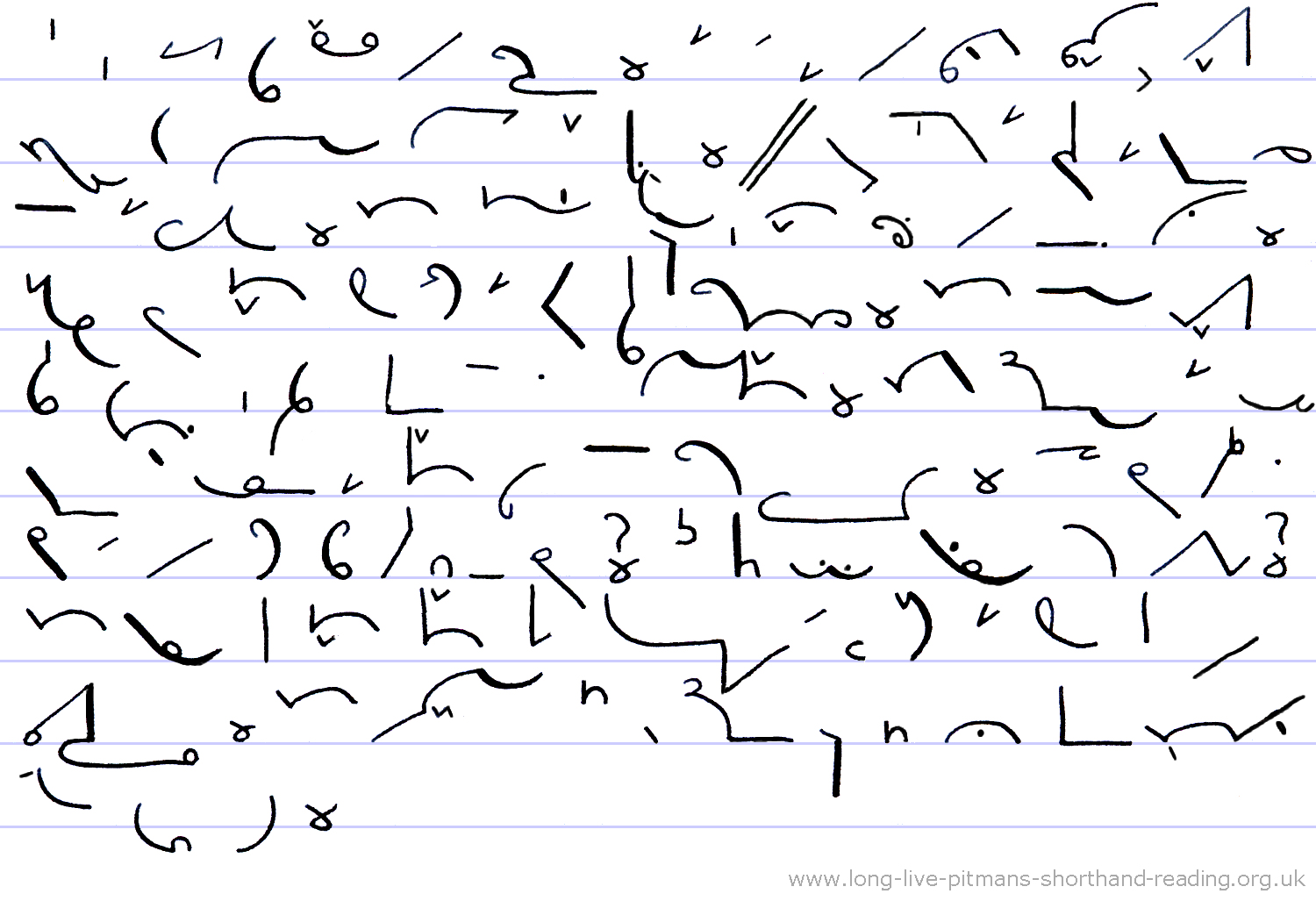
ON, BUT These signs are vertical. "On the" and "but the" are sloped
slightly to the right, to prevent them looking like the I diphthong.
Put the cup on the table but the book must go on the shelf. I am on my
own today but my friends are coming later. I have several people on my
staff and they are on the job at this very moment. I am going to write
on this theme but this will* take quite a long time. I will be working on
the new book all next week* but the time will go very quickly. Can you
speak on such a subject and are there others on which you could speak?
On what do you intend basing your report? I am basing it on my time at
the factory and when I was on the staff at our headquarters. I am
relying on you to work today, but you may take tomorrow off if you wish.
* "this will" Downward L in order
to join the phrase
* Omission phrase "ne(k)s(t) week"
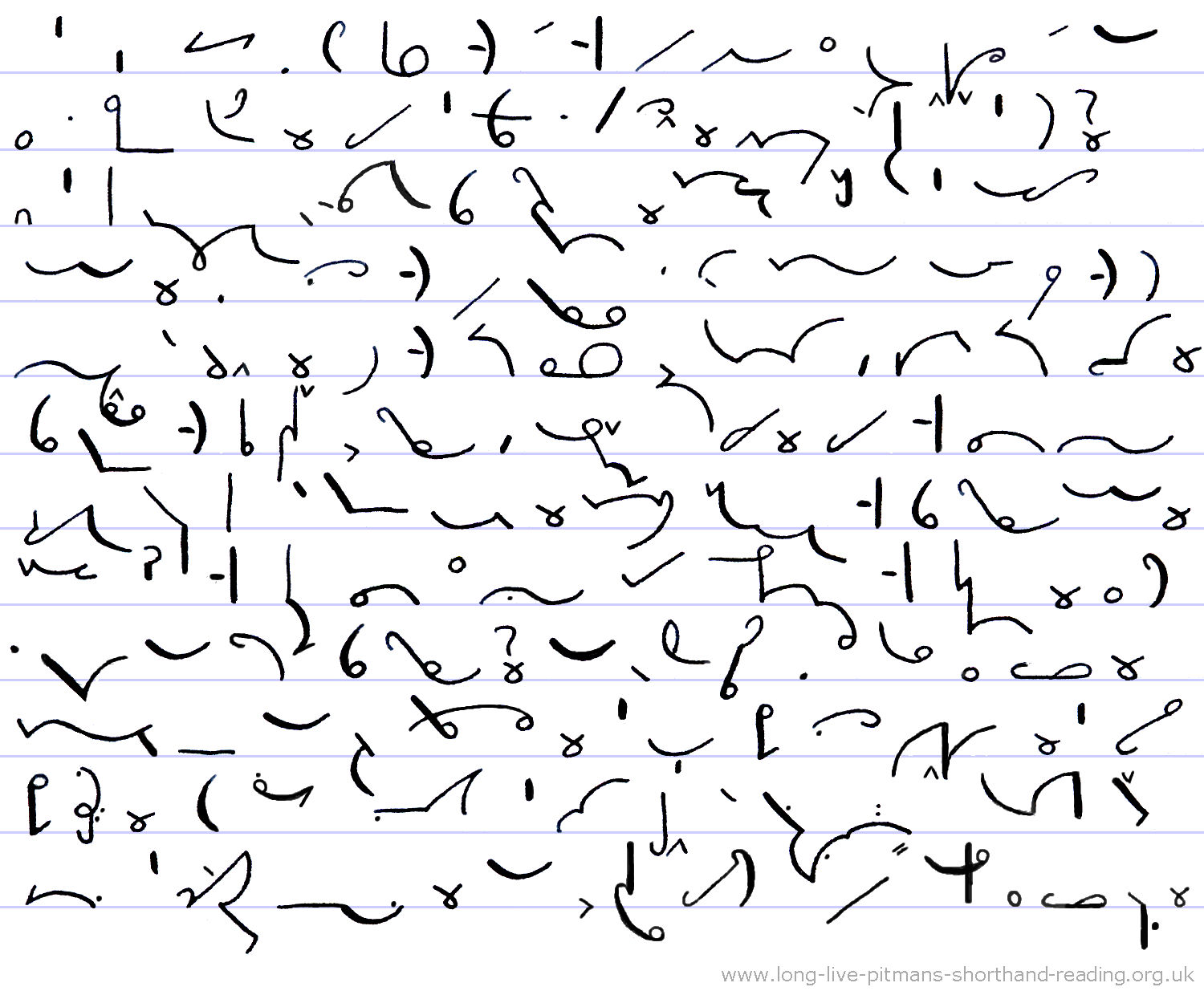
OWE/OH/O, HE The other tenses "owes" and "owed" are written as full
outlines, and "owing" is a stroke short form. We owe this company a
large amount. How much do they owe us? You owe it to yourself to
solve
this problem. I am glad that I do not owe anyone anything. The man owes
our business a lot of money, in fact* he
owes us many thousands of
pounds*. She owes her success to her family who helped her greatly. This
book owes its title to the person who inspired the story. We owed some
money but we have paid it all back now. I am sure I have never owed this
person anything. I knew what he owed, it was the same as many of our
customers owed at the time. Is there a bill owing from this person?
Owing to staff shortages, the office is closed. I am unable to come
owing to other business matters. "Oh no, " said the man loudly. "Oh
yes," said the assistant. They sang the carol "O Little Town of
Bethlehem" followed by the hymn "O Worship the King." Owing* to the
adverse weather, our Languages* Department is closed today.
* Omission phrase "in (f)act"
* "pounds" Always insert the
diphthong, as it could be misread as "pence" in some contexts
* "owing" and "language" share the same short form
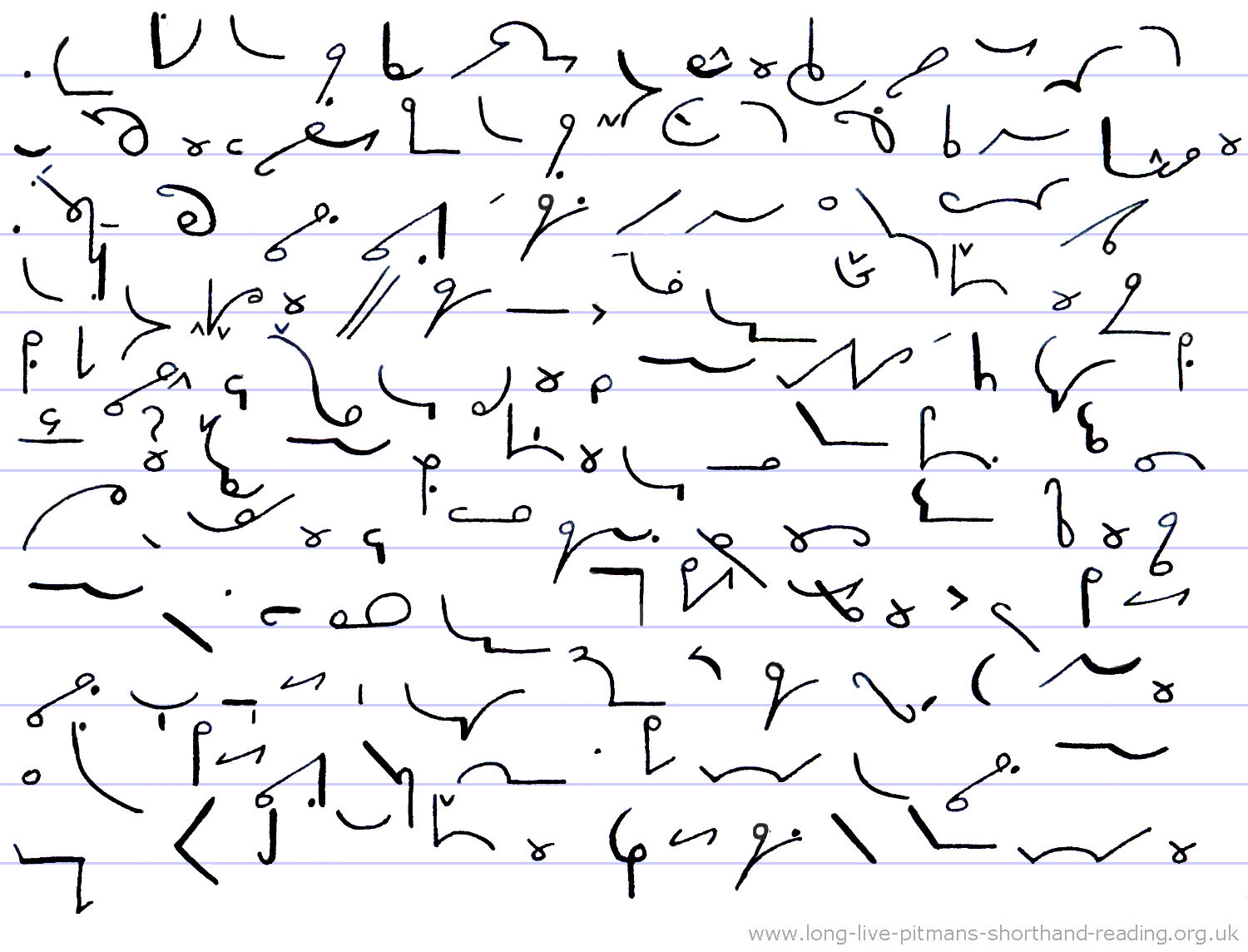
The thick dash for "he" does not reflect the vowel sound. It is only*
used in the middle or end of phrases. When using the stroke for "he",
alone or phrased, it is written downwards. The apostrophied versions
"he’s" "he’d" "he’ll"* are written as per normal rules for full
outlines.
He will come to the office if he can find the time. He can stay at the
house when he arrives if he wishes. Is he going to return and do you
think he will stay with the company? I think he is not going to stay at
home. If he comes back, tell him that he has some letters to answer.
When he calls, he will need to speak to someone that he can trust. He is
going to be a great success if he can get started in the business. All
the people said, "He’s no good" but if he will work hard he will prove
them wrong. His father said, "He’d better make a start tomorrow if he’s
going to get the job done in time." They said, "He’ll be back tomorrow."
* "it is only" On its own, "only"
is written with full N and L strokes
* "He’ll" is formed slightly differently,
by keeping the Hay stroke full and not reducing it down to a tick
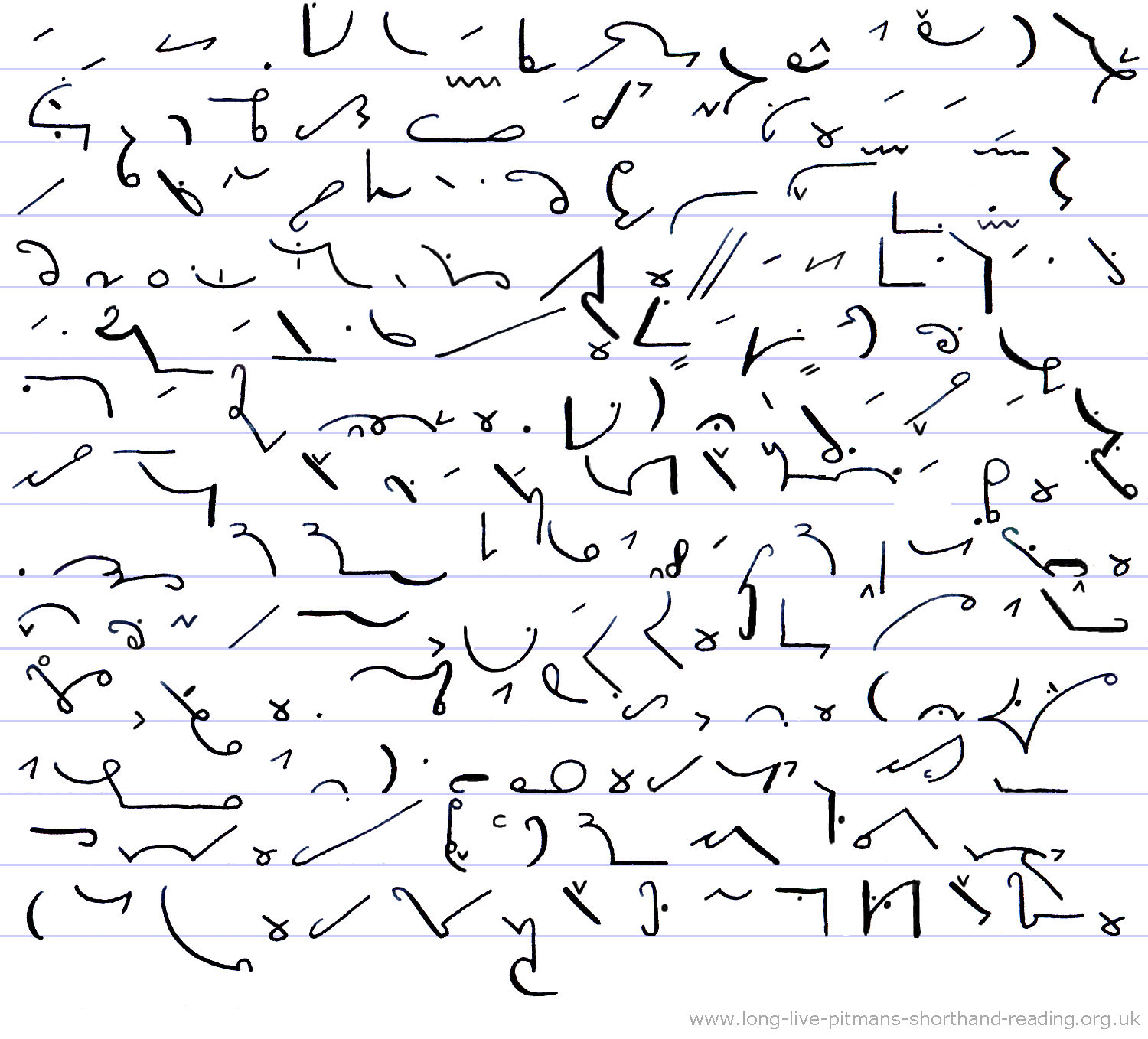
AND, SHOULD The dash for "and" does not reflect the vowel sound and
the sign was obviously allocated to this word because it is one of the
quickest and joins well. "And" and "should" are best not used at the end
of a phrase, as they would look like "tick the", although the phrase
"you should " is common enough to remain readable.
AND Take a pad and a pen and a shorthand book, and become a fast
writer. Jack and Jill and their friends visited the Car and Transport
Museum. The dish was made of beans and rice and vegetables, and was
accompanied by bread and butter, followed by ice cream and sweets. The
men and women* were working at the office, and the students and children
were out in the playground. My friends and I are going to the fish and
chip shop. Take the letters and the bag of parcels to the post office*.
The managers and the staff went to the meeting. They met the
shareholders and the inspectors, and the meeting was a great success. We
enjoyed today and we wish* to come again tomorrow. We are satisfied with
their work and would be happy to employ them in the future. We prefer to
travel by train and not get delayed by the traffic.
* Omission phrase "men (and) women"
"pos(t) office"
* "we wish" This is the same
outline as "we shall" and if necessary you could insert a dot or a
semicircle W sign in "wish" for clarity
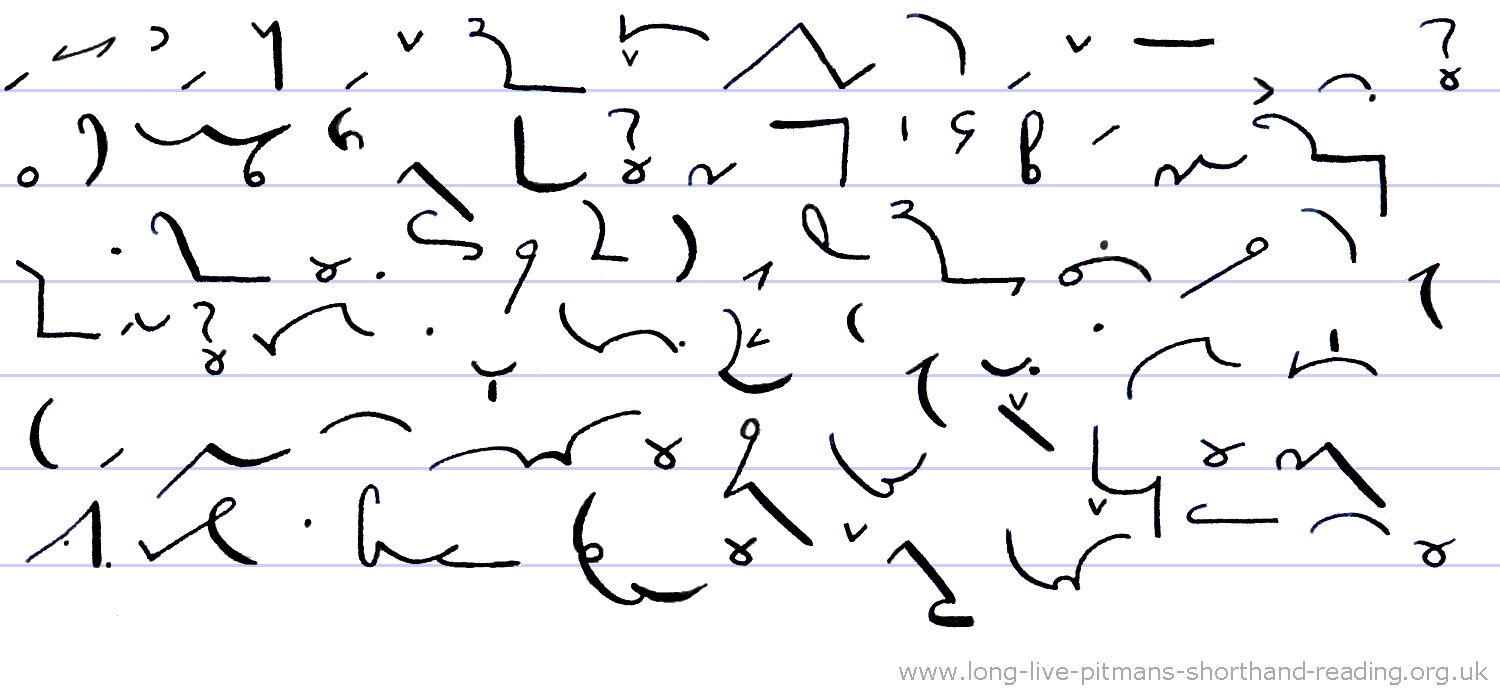
SHOULD What should I do, should I work on my report or should I go to
the meeting? Is there anything else that you should be doing? You should
get on with the studies and you should not forget to take a break. The
question* he asked was, should the staff work the same hours or should
they not? I left a note for him saying that, should they need a lift
home, they should ring me immediately. He should be finished by tonight.
You should be ready to receive a telephone call this evening. I should
be glad if you will call me.
* "question" Optional contraction
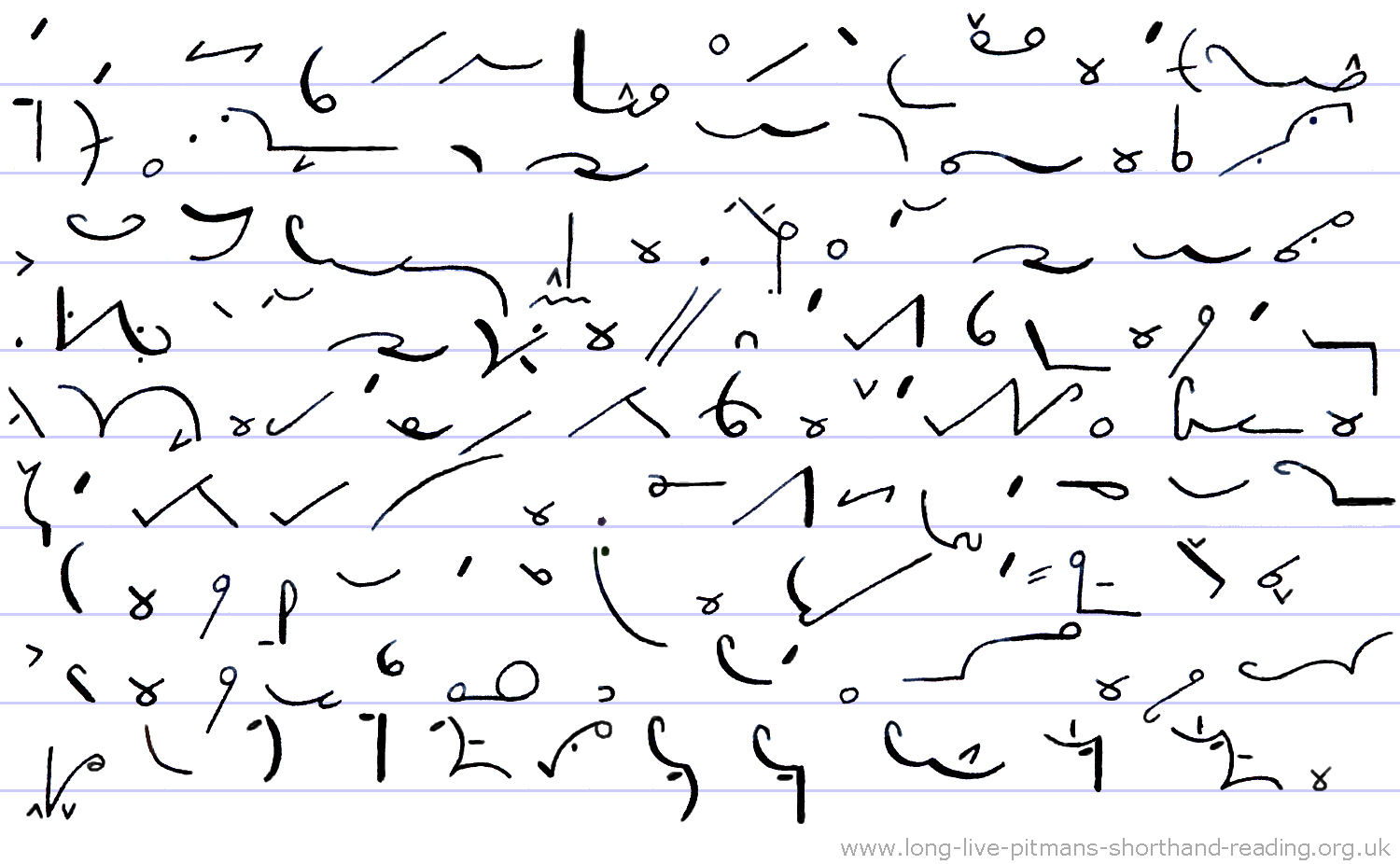
OUGHT/AUGHT/AWE, WHO These are written downwards, as are all thick
signs. "Aught" (pronounced "awt") is an archaic word meaning "anything"
or "something". It is related to the Northern English vernacular "owt".
The opposite is "naught" meaning "nothing", hence the derivation of
"nought" meaning zero.
You ought to read this book. He ought to get up earlier. We ought to
send our reply this morning. I ought to return his telephone call. I
think he ought to reply to our letter. The inscription read, "If you
have aught against any, forgive them." He stood in awe of his father.
They were awe-struck by the height of the building. He knew that his
success would overawe his colleagues. Use normal outlines for awes,
awed, awesome, aweless, overawes, overawed, overawing, unawed, unawesome.
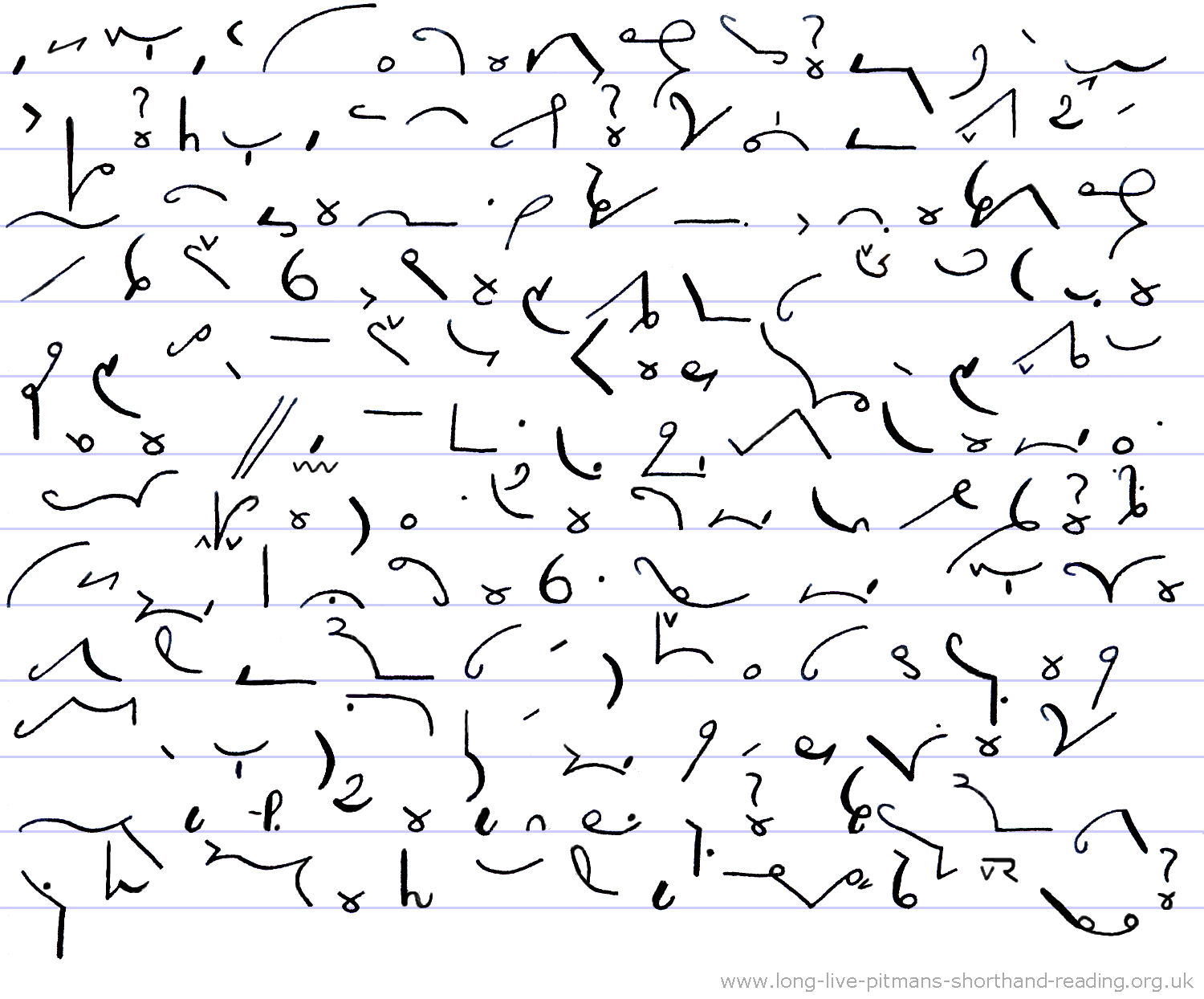
WHO I know who that letter is from. Who will be the successful
applicant? Who can be sure of knowing all the details? Do you know who
called me yesterday? There are some who can write shorthand and many
more who cannot. Make a list of those who are coming to the meeting.
Those who will be successful are those who apply themselves to the
subject. Whoever reads the book will find the information they need. He
said whoever wants to can apply for the job. Send the forms to whoever
writes in to us.
"Who" can take a V hook to represent "have". "Whom" is a normal outline,
"whose" is a short form. From whom have you received this letter*?
Address the letter, to whom it may concern. This is a person whom I know
very well*. We have staff who can work well and whose time is well spent
every day. He wanted to know whose car it was and to whom he should send
the bill. There are many people who have studied shorthand. Who have you
seen today? Those who have completed the work will be paid at the end of
the month. Do you have any staff who have experience of this kind of
business? (1588 words)
* "this letter" Downwards L to make
a good join
* Omission phrase "very (w)ell"
Top of page
Short Forms From Vowel Signs Part 3
(28 February 2013)
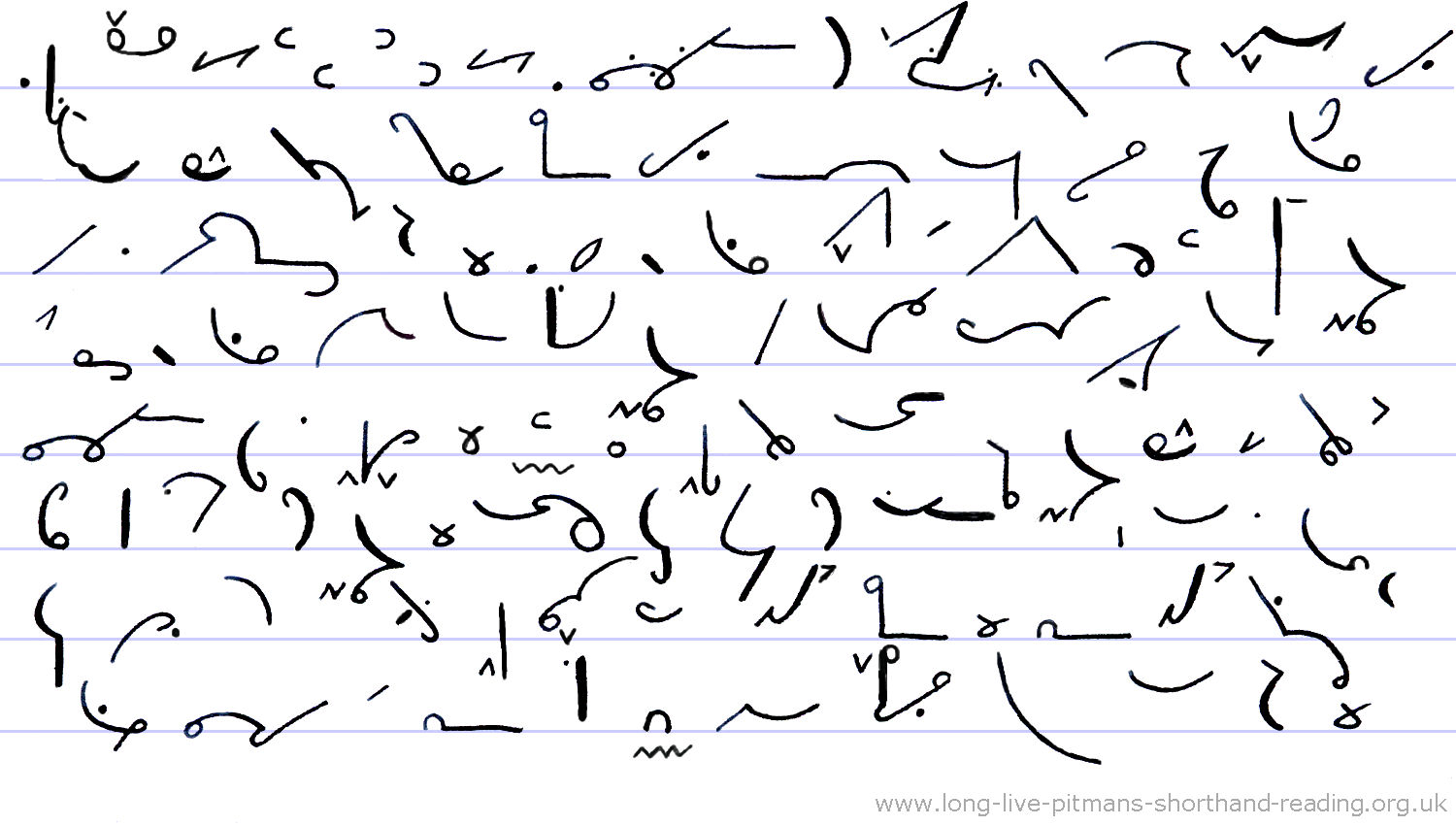
THE DIPHTHONG SIGNS: WITH WHEN WHAT WOULD The semicircle was
originally the principal method of writing the Way sound before the
present stroke Way came into use, and these short forms are a reflection
of that. The first two face right and represent words with dot vowels,
and the second two face left for dash vowels, which follows the normal
rule for the semicircle within an outline. "With" is out of position in
regard to its vowel sound, but the positions of the others do match
their vowels. In phrases they do not change their angle but in a few
they do lean or open out slightly in order to* join the stroke. You can
join the pairs that face the same way and you can add "you" written
sideways after any of them.
* Omission phrase "in ord(er to)"
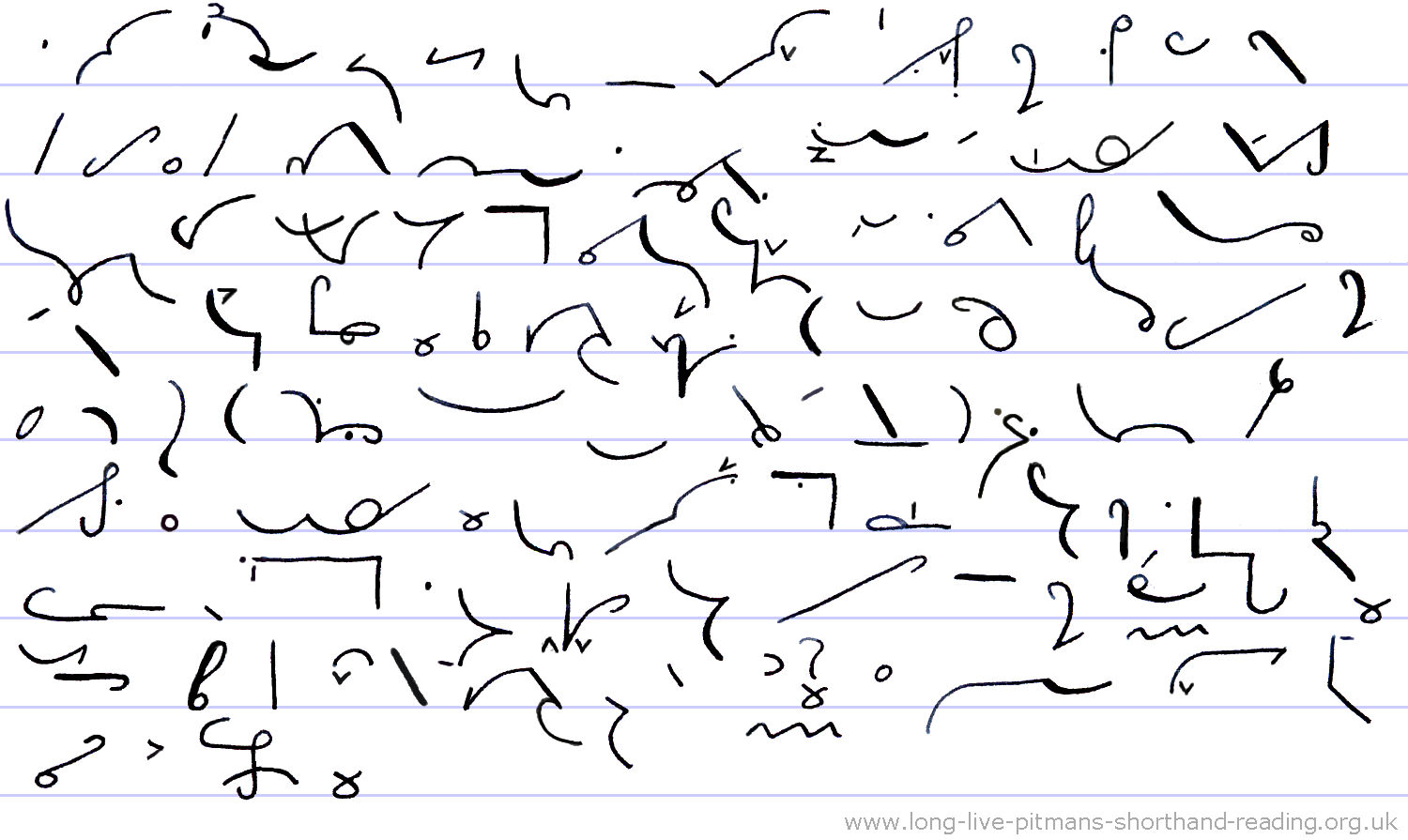
A little warning here, if you come to rely on reciting through the set
in order to* remember which one is which, you will be making a miserably
annoying and unnecessary burden for yourself that will unfortunately*
only get heavier over time, not a happy state of affairs by any means
and to be avoided at all costs. It is helpful to drill them in phrases
where they are the first word, so that they remain in their own
position, and become so completely familiar that such recitation is
unnecessary. If you really get stuck over them during a dictation, it
would be quicker to concoct a full outline for them rather than go
through the "song". In the beginning stages, it might be helpful to
think of "what?" as looking like the top half of the question mark.
* Omission phrase "in ord(er to)"
* "unfortunately" Optional
contraction
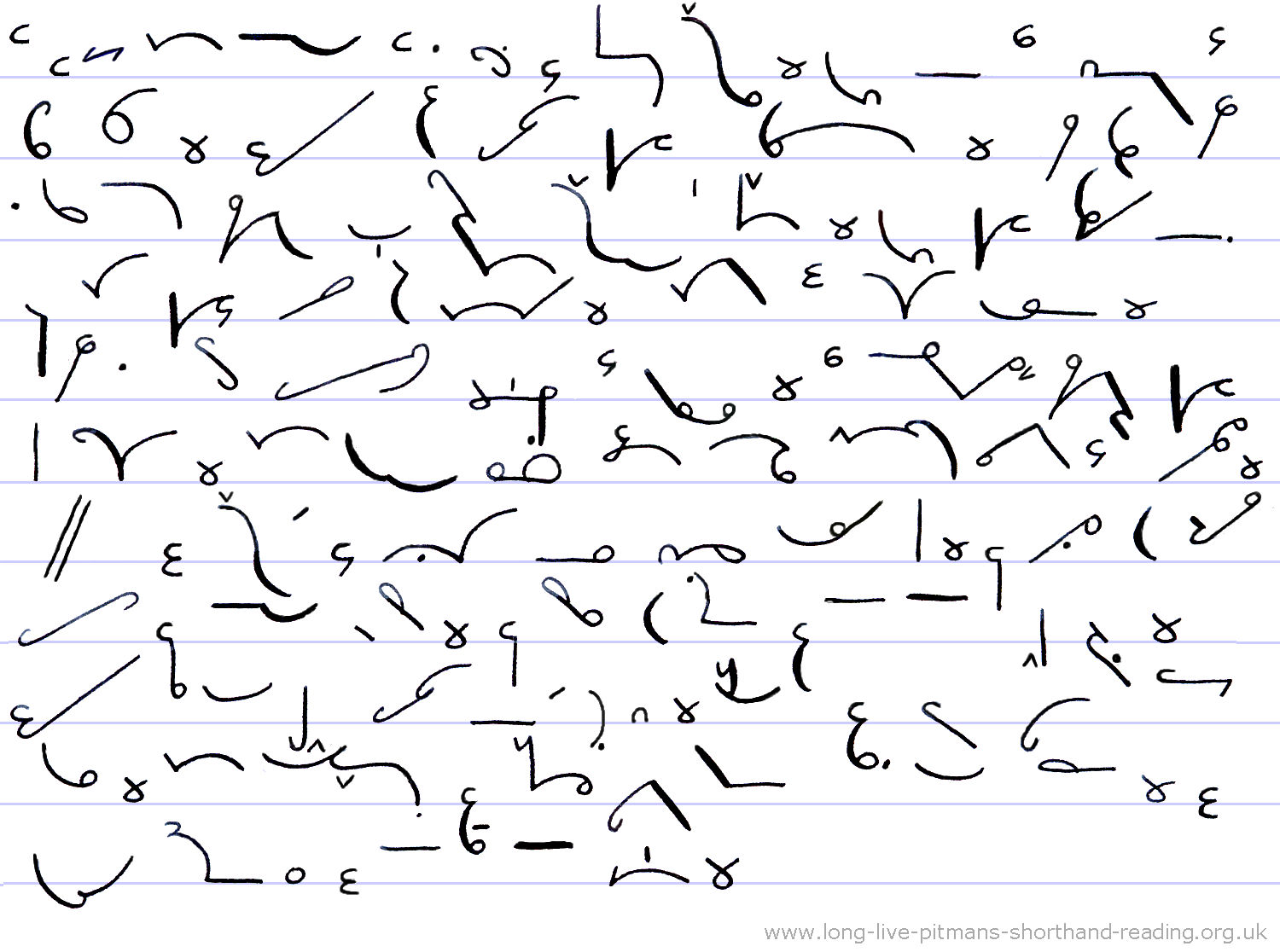
WITH WHEN I am going with a friend when the taxi arrives. If you come
with us, you can be with the others as well. When we are with them, we
will deal with this matter. He thinks that with such a fast car he will
have no problem arriving on time. If you deal with those who are coming
today, I will deal with the rest of them tomorrow. I will be with you
early next week*. With such a plan, we are sure to succeed with the
business. With his experience he will be able to deal with it very well*.
I am having success with the same methods, and I am very happy with the
results.
When you arrive and when the mail comes, you must answer it. When it
rains, they always wonder when it is going to stop. When it stops, they
ask when they can go out to play. When we are in town, we will come and
see you. I do not know when these people will call the office. I am
enquiring when those items will be back in stock. When you finish work
is when you can go home.
* Omission phrases "ne(k)s(t w)eek"
"very (w)ell"
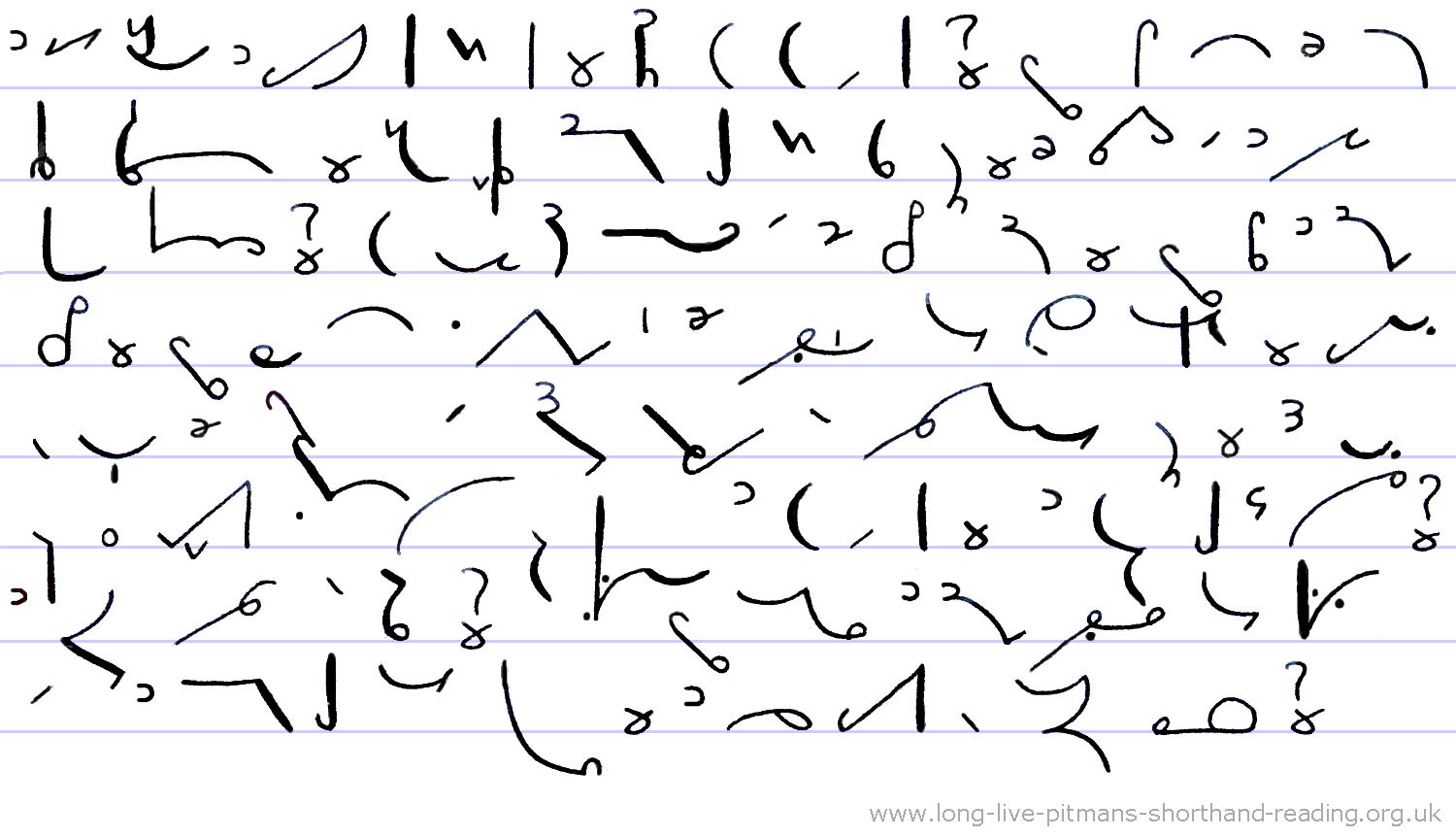
WHAT I do not know what we shall do about it. What do you think they
should do? Please tell me what is your decision on this matter. I have
decided what can be done about this issue. What has happened and what
are you doing at the moment?* They knew what was going on and what the
circumstances were. Please tell us what were the circumstances. Please
send me a report on what is the reason for the losses in that
department. We need to know what is the problem and what would be the
best way* of resolving the issue. What you need to do is to write a
letter to them, detailing what they should do. What have they done with
the letters? What shall be the result of all this? Please inform us what
were the reasons for the delay and what can be done in the future. What
must we do to ensure success?
* Omission phrases "at (the)
moment" "bes(t) way"
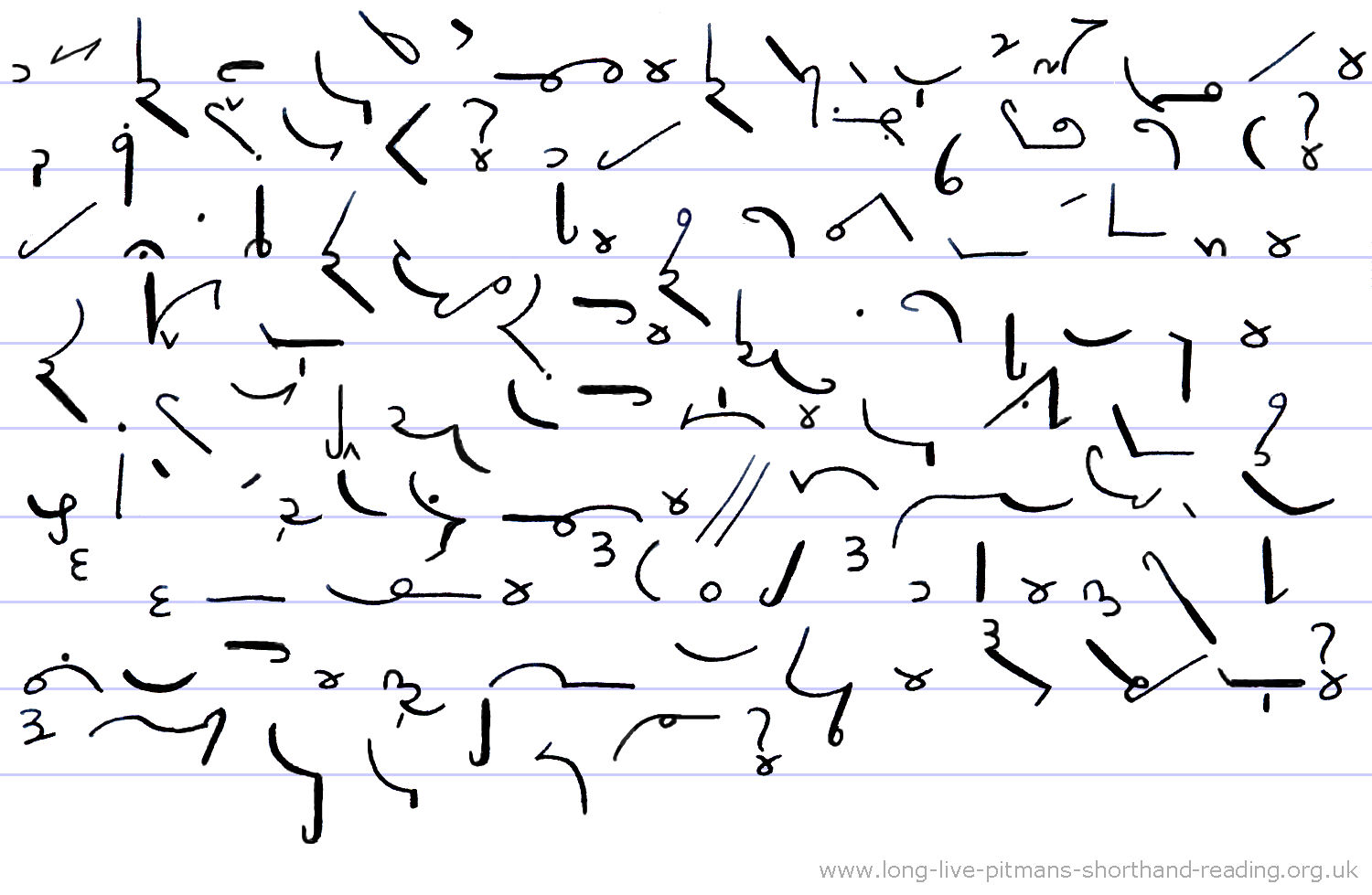
WOULD It would be great if he passed all the exams. It would be better
to know what the actual figures are. Would he consider applying for the
job? Would we accept these applications from them? We made a decision
which would be to everyone’s advantage. He would be very happy to come
and talk to you. She would be delighted to go shopping again. It would
not have been a very difficult thing to do. The people in the town would
never have gone home. If he read the book he would understand it all and
would not have* failed the exam.
I am looking forward to being with you when you come next week*. What you
think is generally what you would do. You would probably do the same
thing again. You would not make any changes. What would be the best way*
to go? What would the manager have done if he had been here last week?*
*
"would not have" The "have" is not phrased,
because it would look too much like "would never", and it is always
helpful to insert the vowel in "not" in phrases
* Omission phrases "ne(k)s(t w)eek"
"bes(t) way" "las(t w)eek"
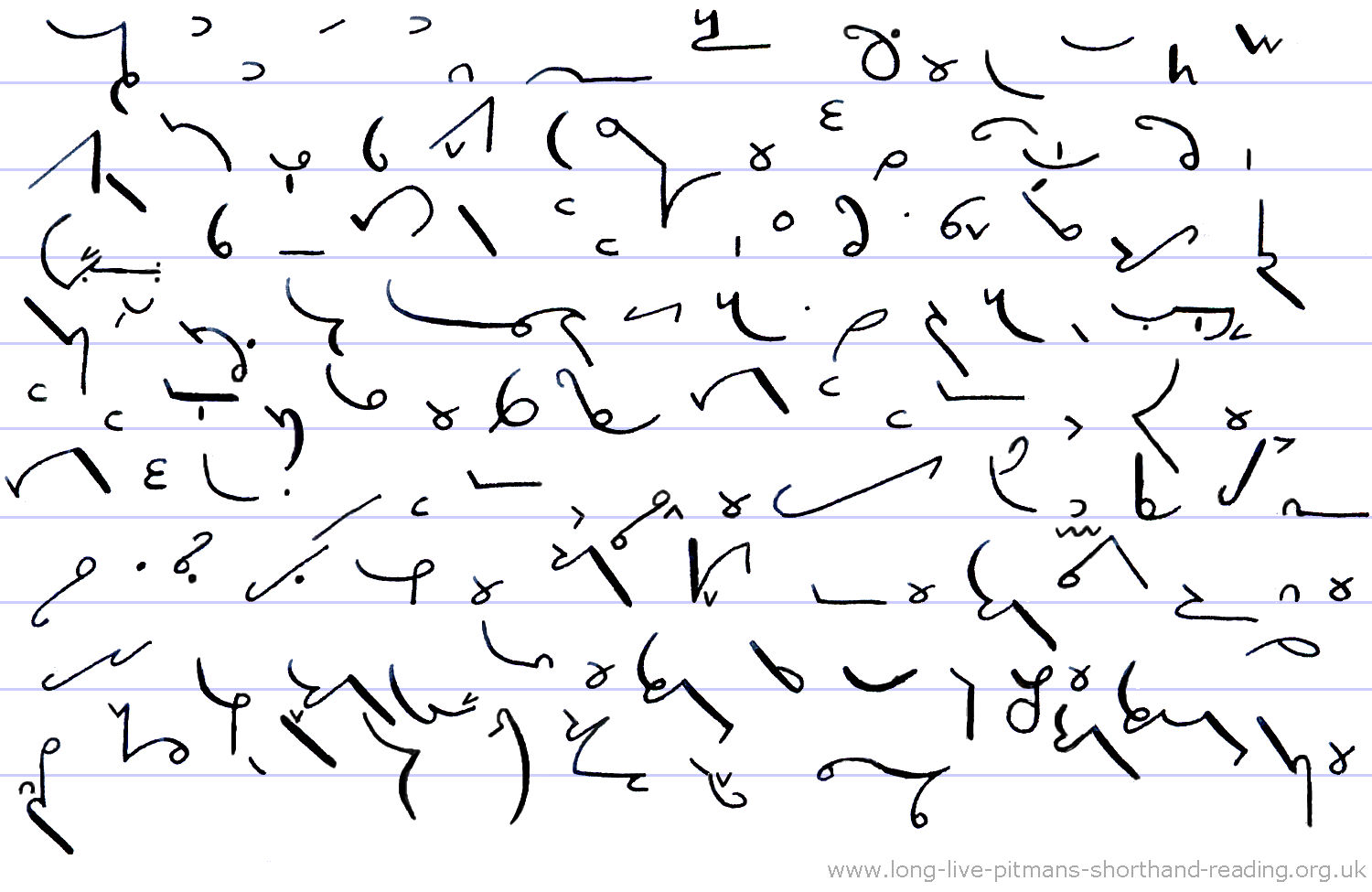
Notice that "what would" and "what you " make identical phrases. If in
doubt about the readability of your notes, then write them separately.
"With you" is the more common phrase but theoretically this could also
be "with when", but as there is a slight pause between, it would be
better not to phrase for that, for example: I have a list of people I
have to negotiate with when I go to their office. This is the person I
will be with when I come to the shop. I will be with you for an hour
when I come to the house. Where the short form "would" does not join,
you can use a halved Way instead: I would be delighted to come. They
would be happy to call you. We would visit if it would be convenient for
you. This would be the best thing to do under the circumstances*. These
would not be the most suitable items to buy for them and therefore I
would like you to find something else that would be better.
* Omission phrase "under (the)
circumstances"
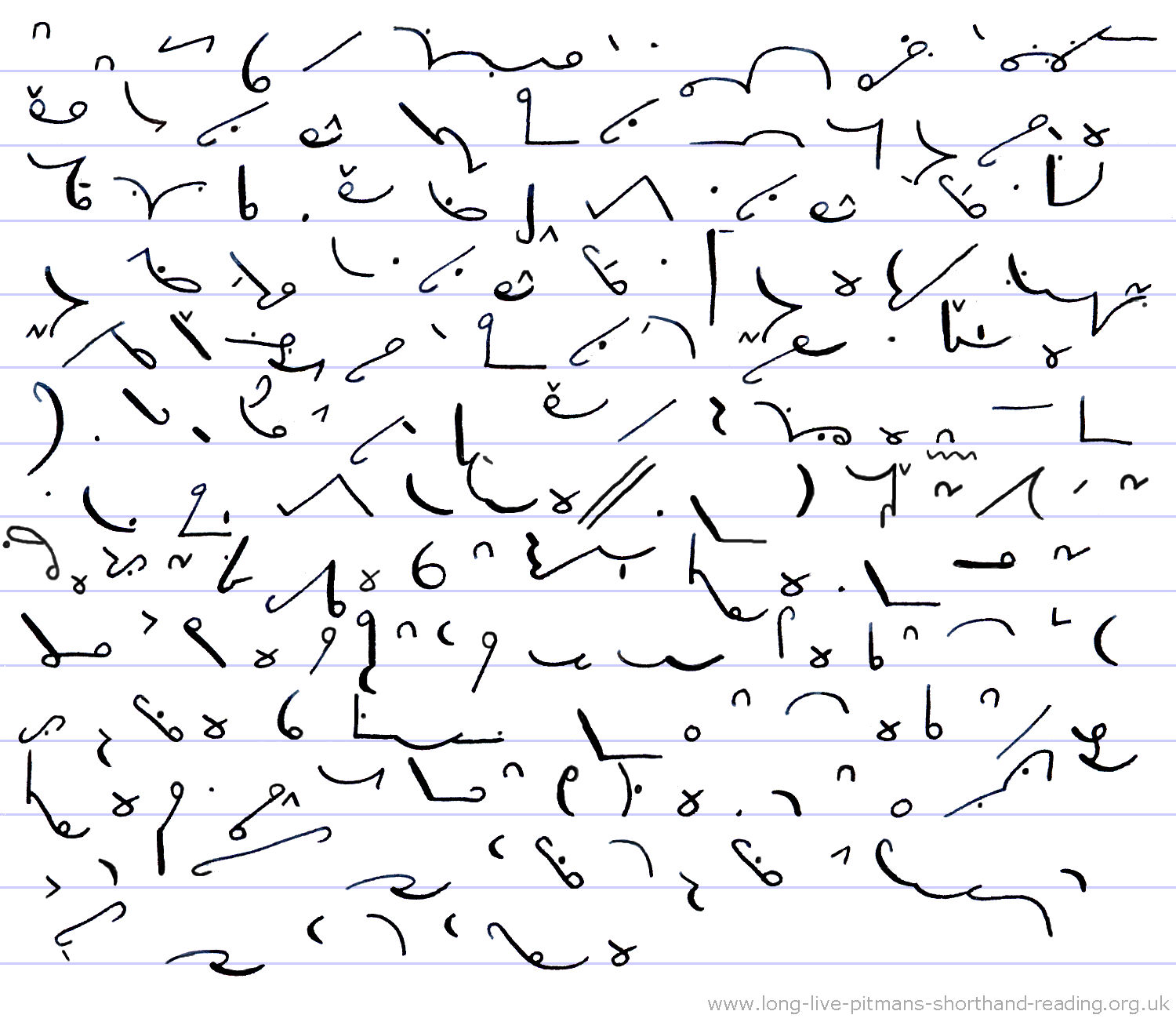
BEYOND, YOU These are remnants of a similar series of semicircle signs
for the Yay sound, before the stroke Yay came into full use. In those
early days the sign faced down to represent a Yay sound plus a dash
vowel, and faced upwards for a Yay sound plus a dot vowel. They were
eventually replaced by extending the use of stroke Yay or using a
diphone. Therefore the above two short forms and the U diphthong sign
are all that remains. "You" can take a V hook to represent "have". //
The book was entitled "Beyond the Earth and Beyond the Stars." I went
beyond the edge of the woods. This is beyond all that we know at
present. The book goes beyond the basics of the subject. He said that,
beyond that, he knew nothing at all. It is beyond me why they went to
that place. This technical book is beyond me. It is beyond our
understanding at present. He had a house in the back of beyond, as they
say. The word beyond is related to the word "yonder", meaning "that
place" or "to that place" and the vernacular word "yon" meaning "that"
or "that person".
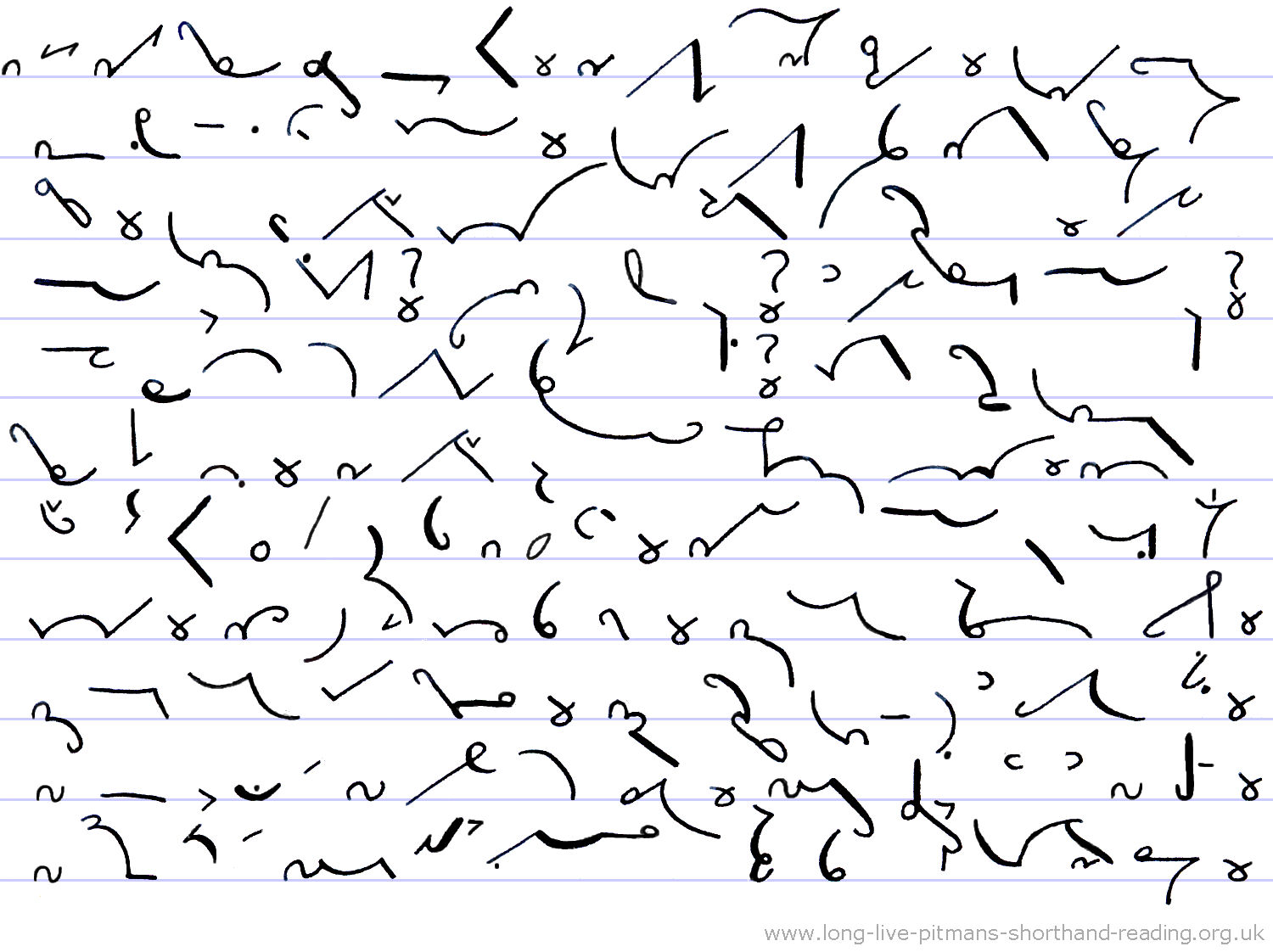
YOU You are the person who has been given the job. You should read the
manual straight away. If you are careful, you can save quite a lot of
money. If you will read this letter*, you will be pleasantly surprised.
If you were* able to reply to my letter, I would be very pleased indeed*.
Are you going to the party? Will you see the staff today? What are you
going to do? Can you send me your report this afternoon? I will be very
glad if you can be present at the meeting. You should reply to that
customer immediately. You may find that the job is much easier than you
first thought. You are not* going to be needed until tomorrow. You will
not wish to miss this opportunity. You were* informed of this matter
yesterday. You were not* kept informed of our progress. You would be very
pleased if you could* see what we have achieved. You have come to the end
and you have received your certificate. You have not been disappointed
with what you have done. You have worked hard and you have now joined
the ranks of those who have this valuable skill.
* "this letter" Downward L in order
to make a good join
* Omission phrases "if you (w)ere"
"very please(d) indeed" "you (w)ere"
* "you are not" "you will not" Note
that "are not" is written with full strokes, and "will not" uses N Hook
and halving, this keeps these two quite different, as they could easily
be misread for each other when written at speed
* "if you could" Note that "could"
is generally not phrased, so that it is not misread as "can"
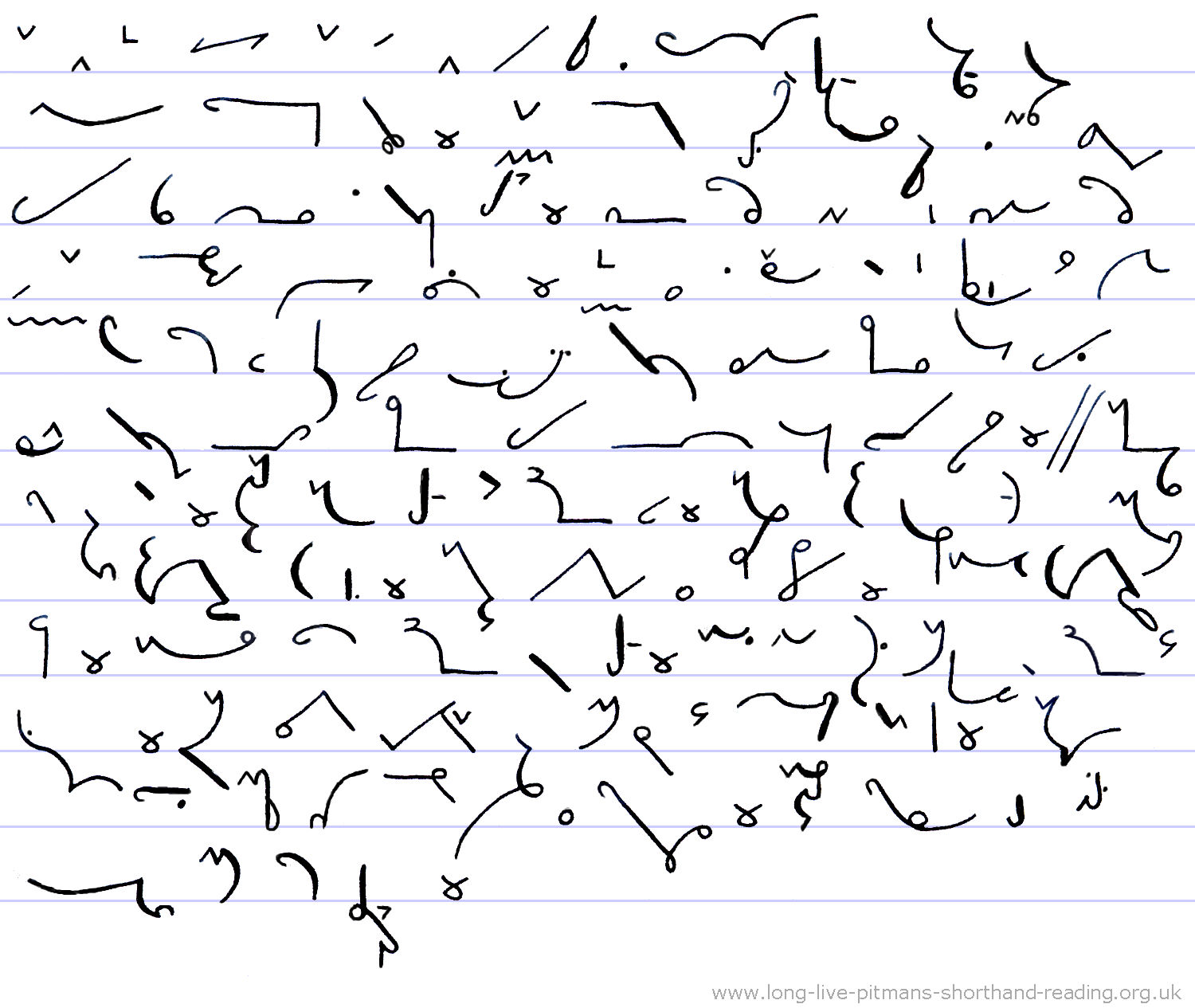
I, HOW, WHY "I" and "how" are just the normal diphthongs for those
vowels, and in their correct positions. "I" can be shortened to just the
first part, where this makes a better join. You can phrase "how the",
but you should not phrase "should I" because that would look the same.
"Why" is a sign all on its own, and is left over from when it was used
initially before certain strokes for the Way sound, before the current
stroke Way came into greater use.
I take this opportunity to thank you all. I do not think that I have
done all the work yet. I have suggested that they visit us and I feel
sure* that they will be glad they did. I hope that the* report is
satisfactory. I know that they will be pleased with it. I know there is*
more work to be done. I need not say that I shall continue to work with
the firm. I shall be happy to reply to this letter* and I shall speak
with the manager about it. I think he will agree and
I trust you will
accept his proposals. I understand that the person did not attend the
interview and I was very disappointed.
* Omission phrases "I fee(l) sure"
"I (h)ope that the"
* "I know there is" Doubling to
represent "there"
* "to this letter" Downward L in
order to make a good join
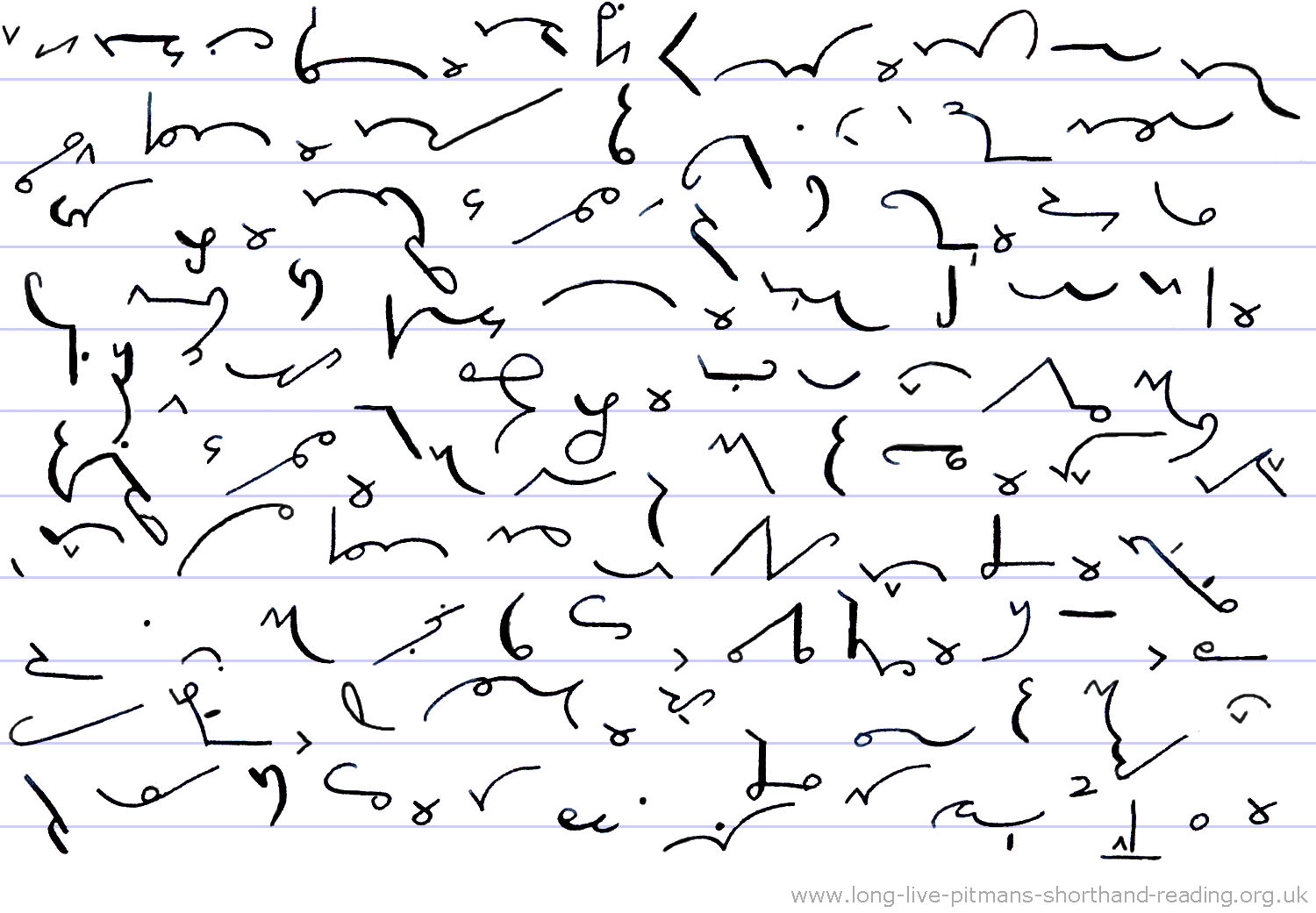
I: I agree with the man on this matter. I am able to start the job
immediately. I am also* going to move house at the same time. I am aware
that this will be a lot of work and I am certain that you will
understand. I am very pleased with the results and I believe they are
very good. I call the office every day and I can assure you that they
are dealing with the matter. I could not have done anything about it. I
do not see how anyone could be successful under the circumstances*. I
gave in my report and accounts*, and I feel sure* that they will be
pleased with the results. I have written to them and I hope* that they
agree with us. I like to reply to all my letters at the same time and I
must now return to my desk. I propose to call a meeting and I have
referred this question* to the heads of department. I shall go to the
school where I spoke to the staff last month*. I want to discuss
something with them and I think that we might be able to answer all
their questions*. I will send you an email* and I will let you know what
the outcome is.
* "I am also" The outline for
"also" can lose its initial vowel sign in phrases
* Omission phrases "under (the)
circumstances" "rep(ort and) accounts" "I fee(l) sure"
"I h)ope" "las(t) month"
* "question" Optional contraction
* "email" Always insert the first
vowel, as it is similar to "mail"
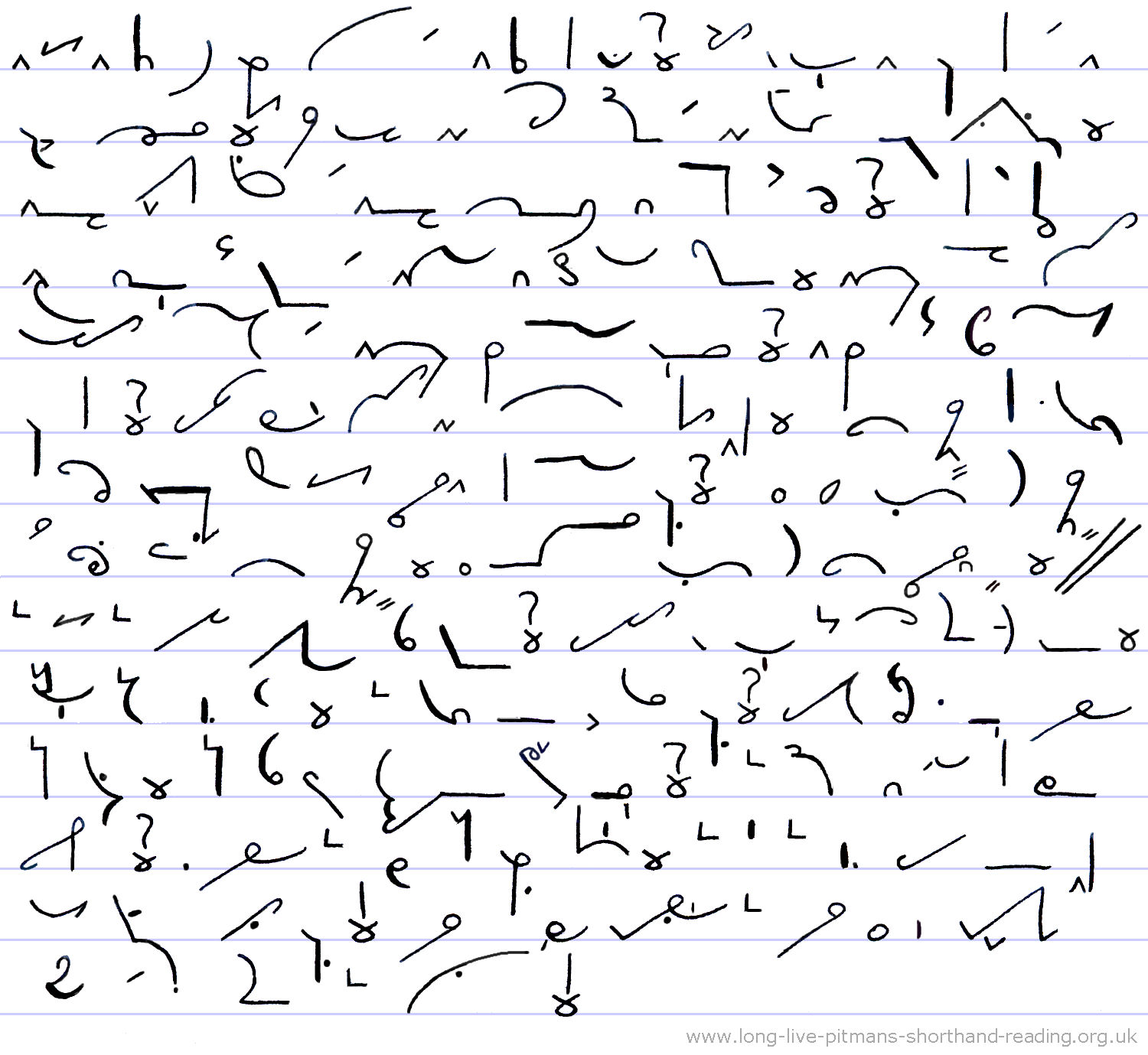
HOW How do you wish to start the letter and how does it end? I want to
know how to do it and how to avoid* mistakes*. He knew how the machine
worked and how the fault could be repaired. How can you write faster and
how can you make sure you get all the words? It all depends how far* you
go with the book and how long you spend in practice. How much can you
learn in one month and how much is it going to cost?
How is it that the
others managed to do it? We will soon learn how the matter turned out.
Mr Howe* had a favourite phrase to greet the staff
"How’s it going
today?". His first name was Hugh and his friends called him Hughie. His
colleague’s name was Mr Hughes.
WHY Why are you reading this book? We want to know why the man asked
us to come. I do not know why they did that. Why have you come to the
office today? We think that there is a good reason why it failed. Why do
those people think that we can supply the goods? Why were you not at
school yesterday? The reason why* is that I had to stay at home. Why O
why did we come out in the pouring rain today! Ours is not to reason
why, ours is but to write the shorthand and ask why later! (2036 words)
* "avoid" Insert the diphthong, and
the second vowel in "evade", as these two are similar in outline and
meaning
* "mistakes" omits the T, similarly
"mistaken". "Mistook" has the stroke T.
* "how far" Note "far" on its own
uses full strokes F and Ar
* "Mr Howe" Short forms are not
used for names
* "reason why" This is a colloquial
way to say this, the sense does not need the word "why" as that meaning
is contained in "reason"
Top of page
|
